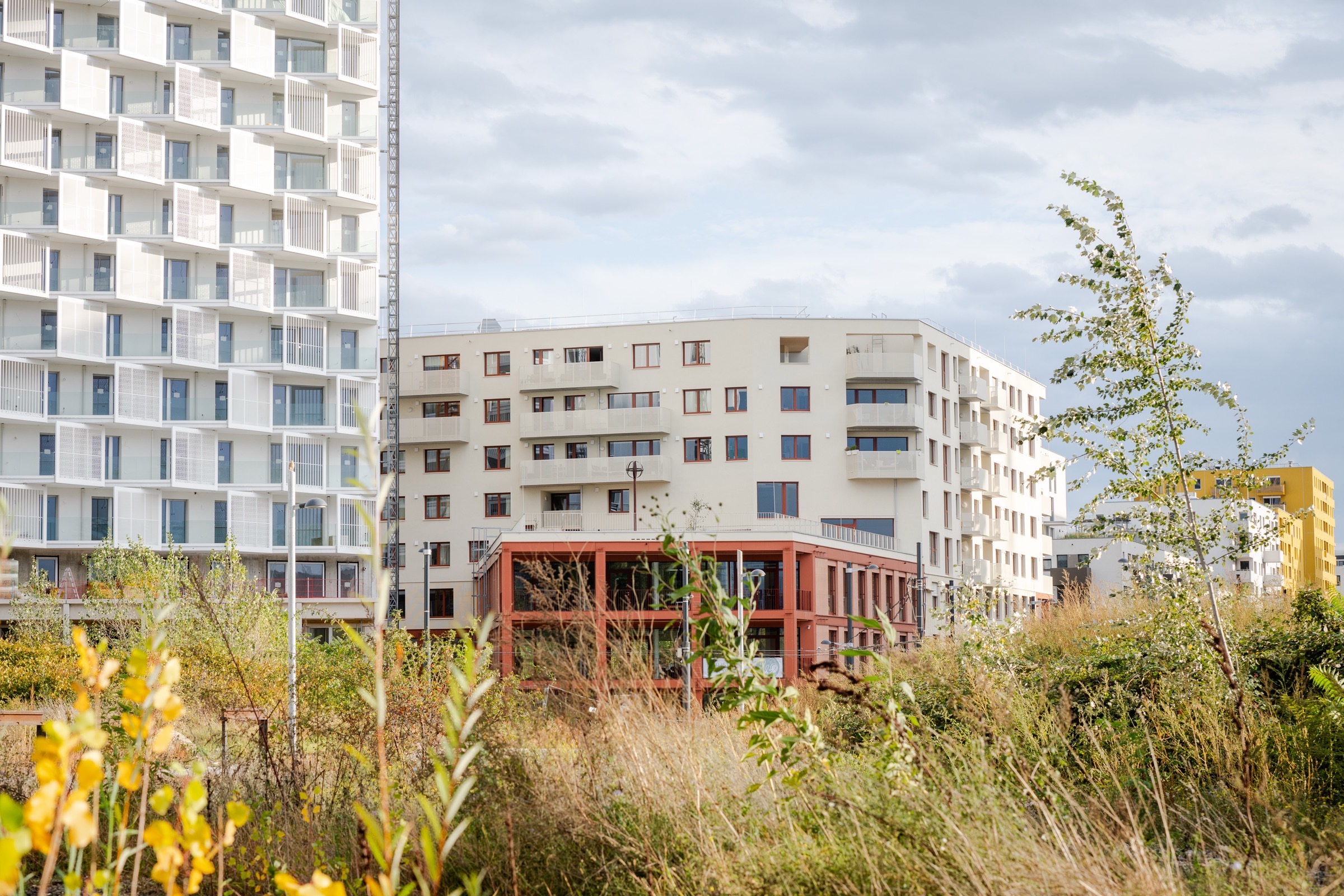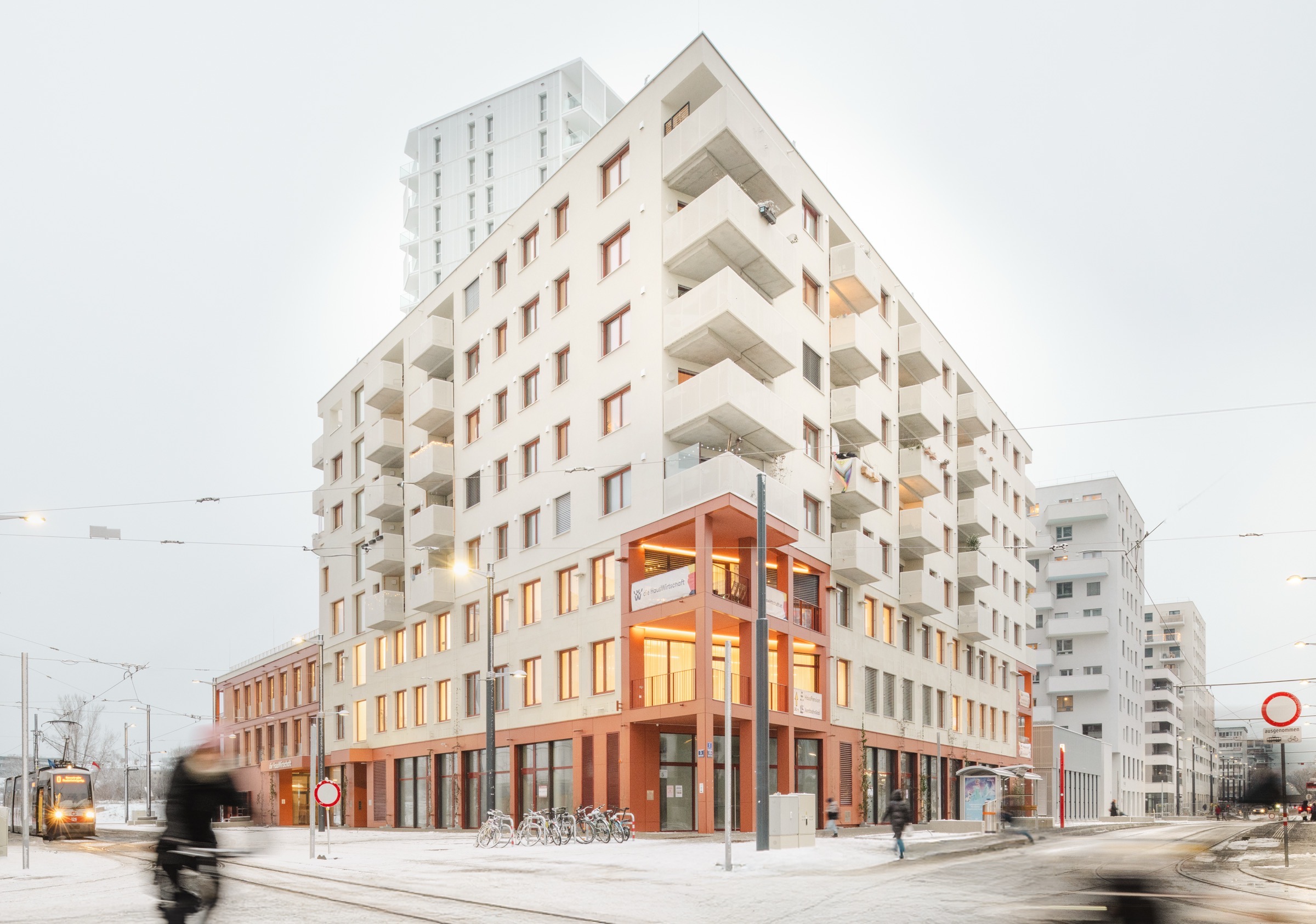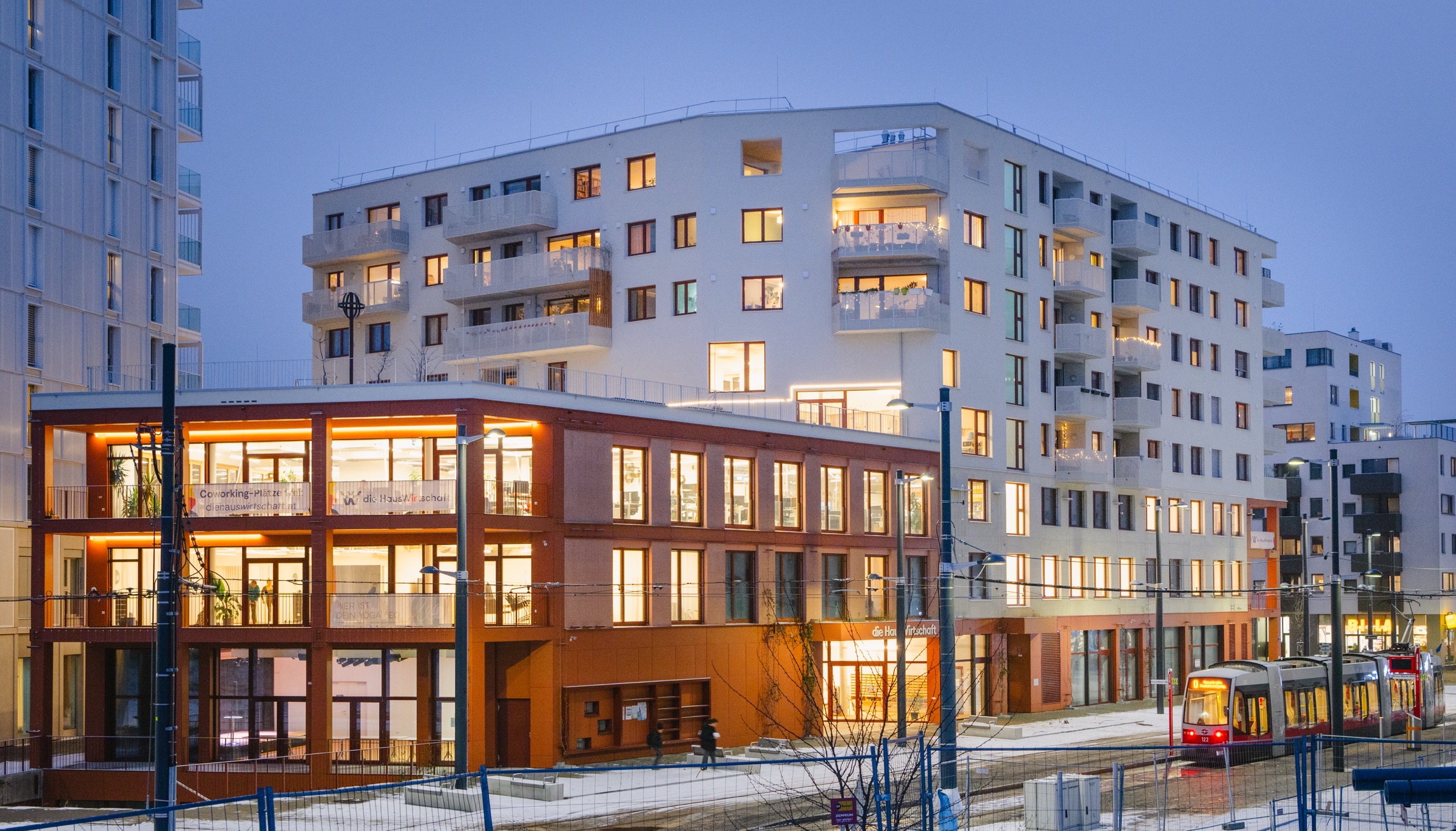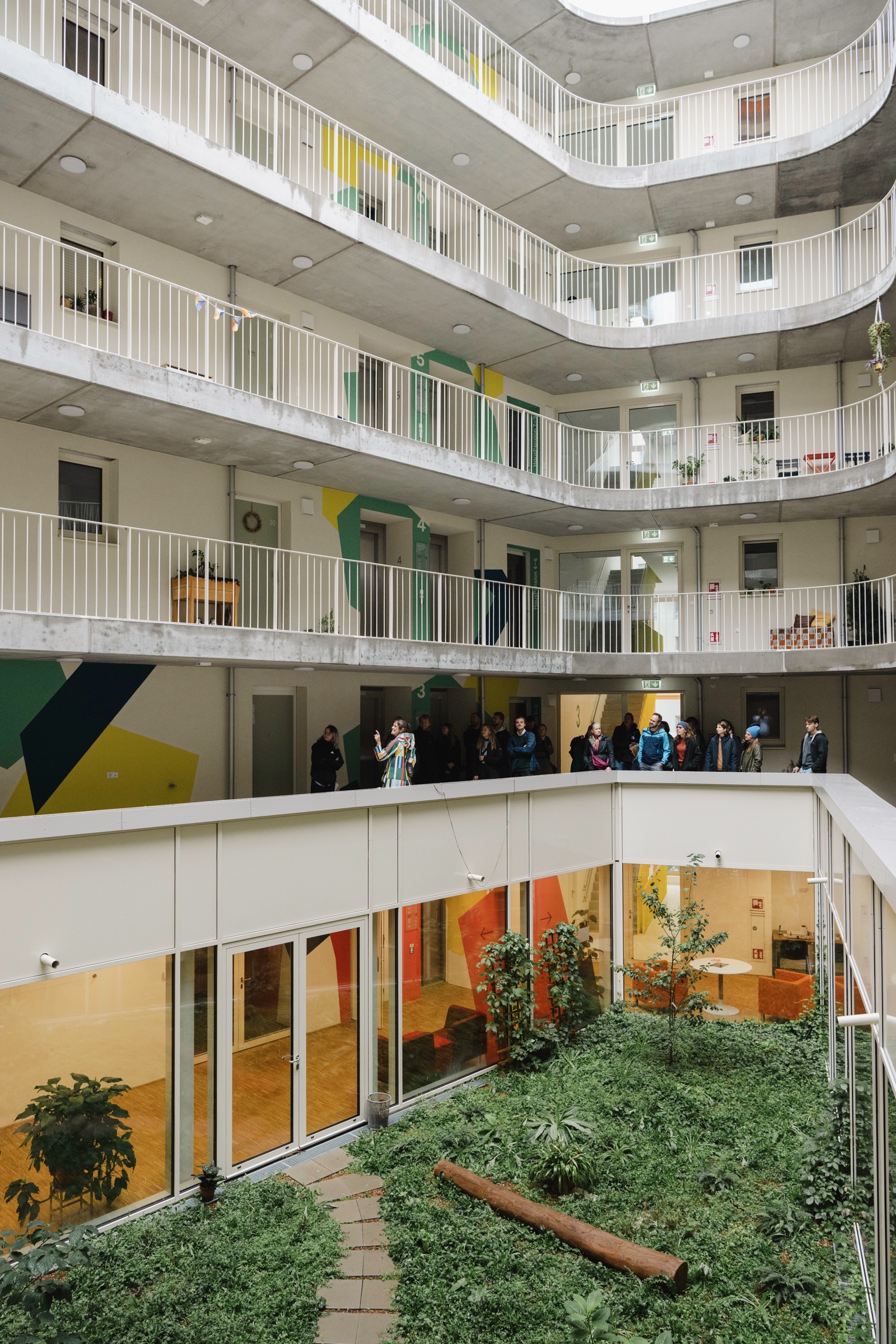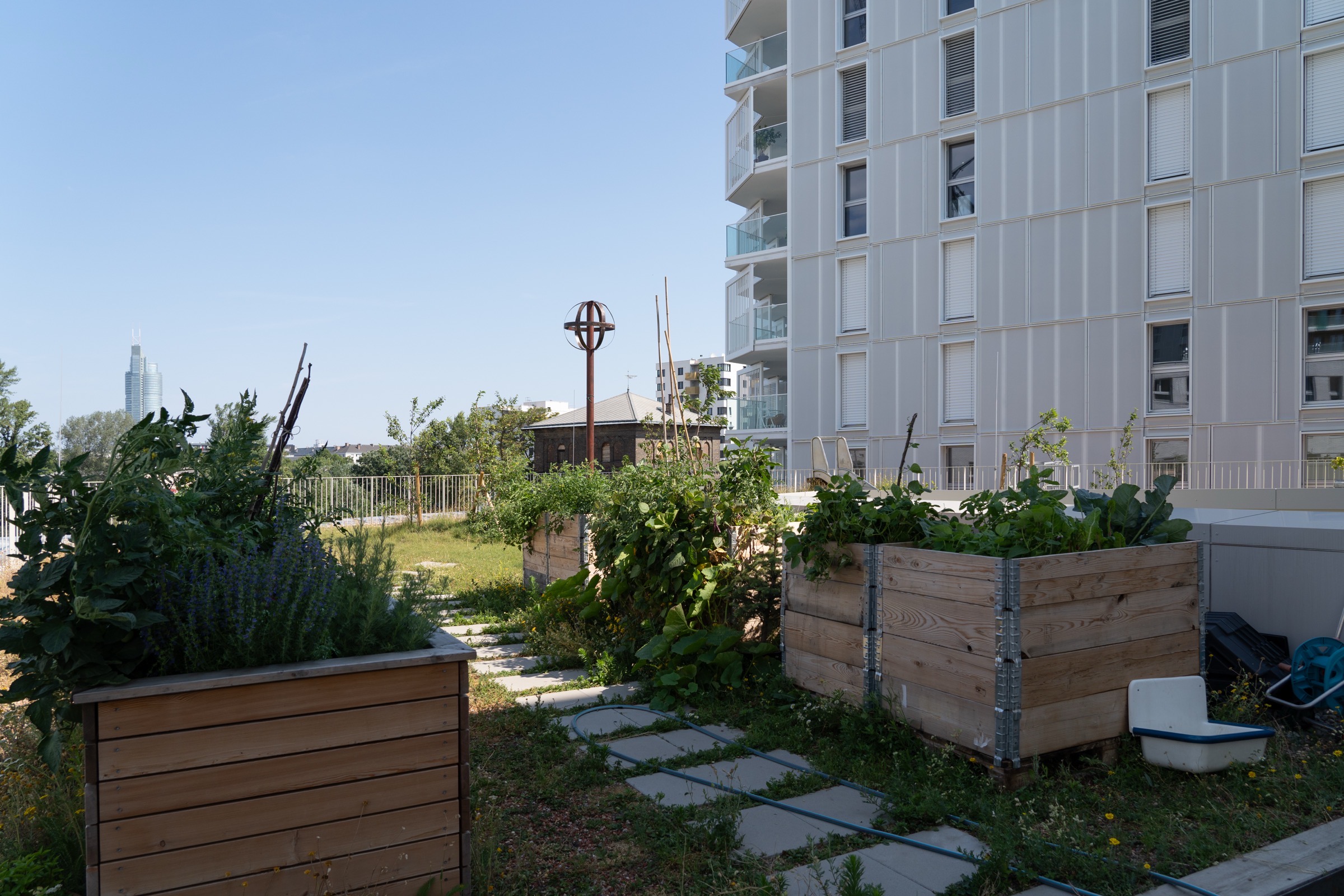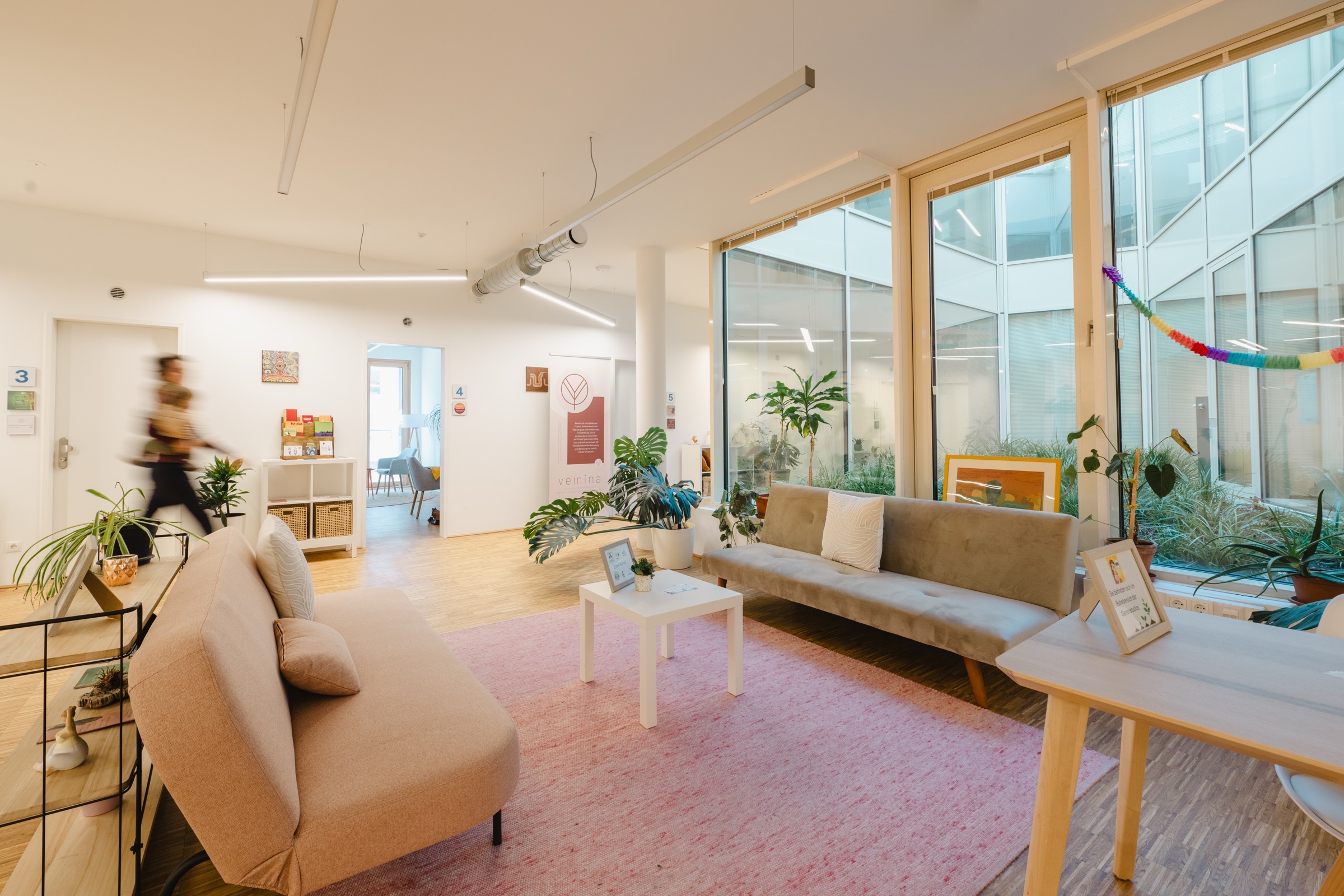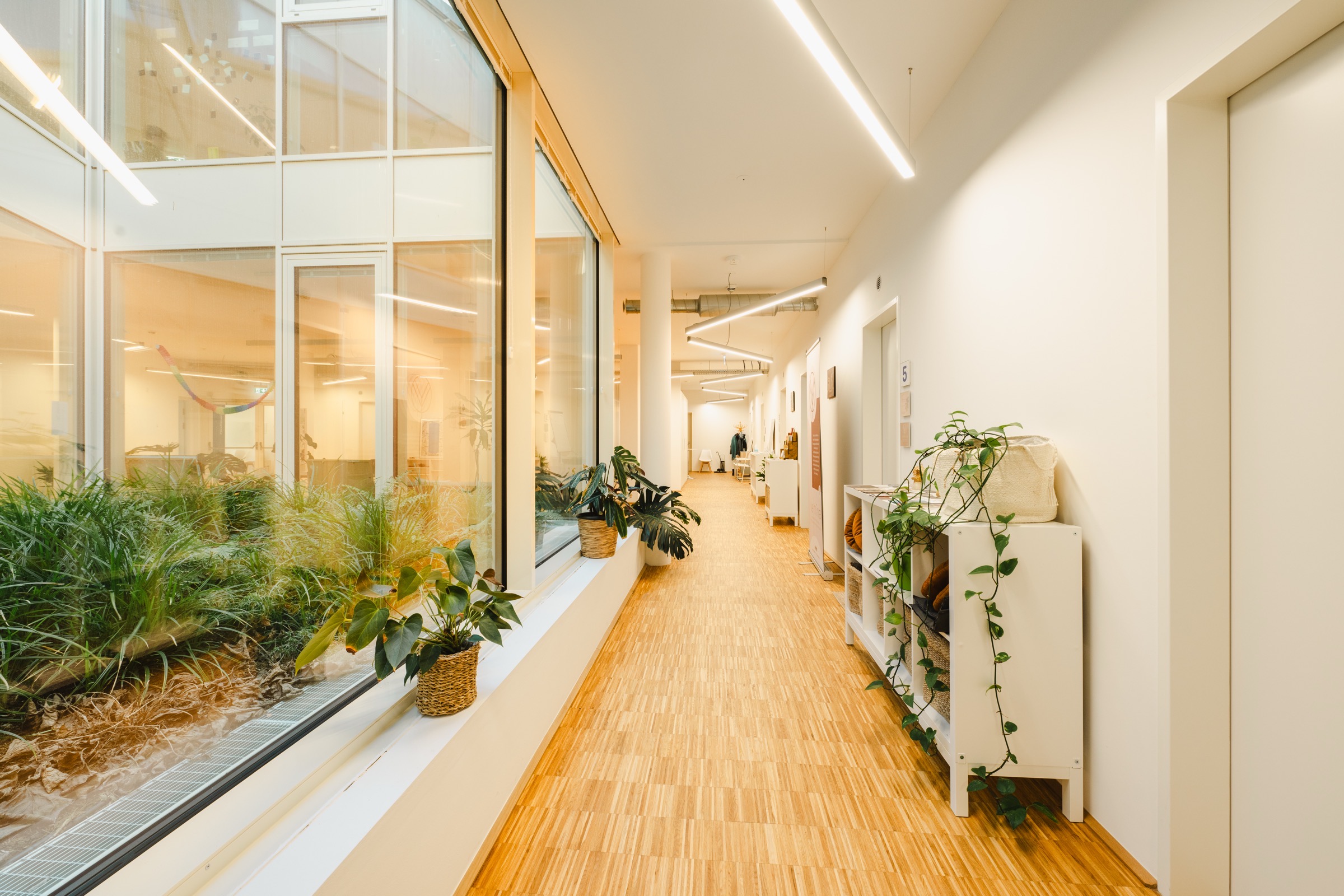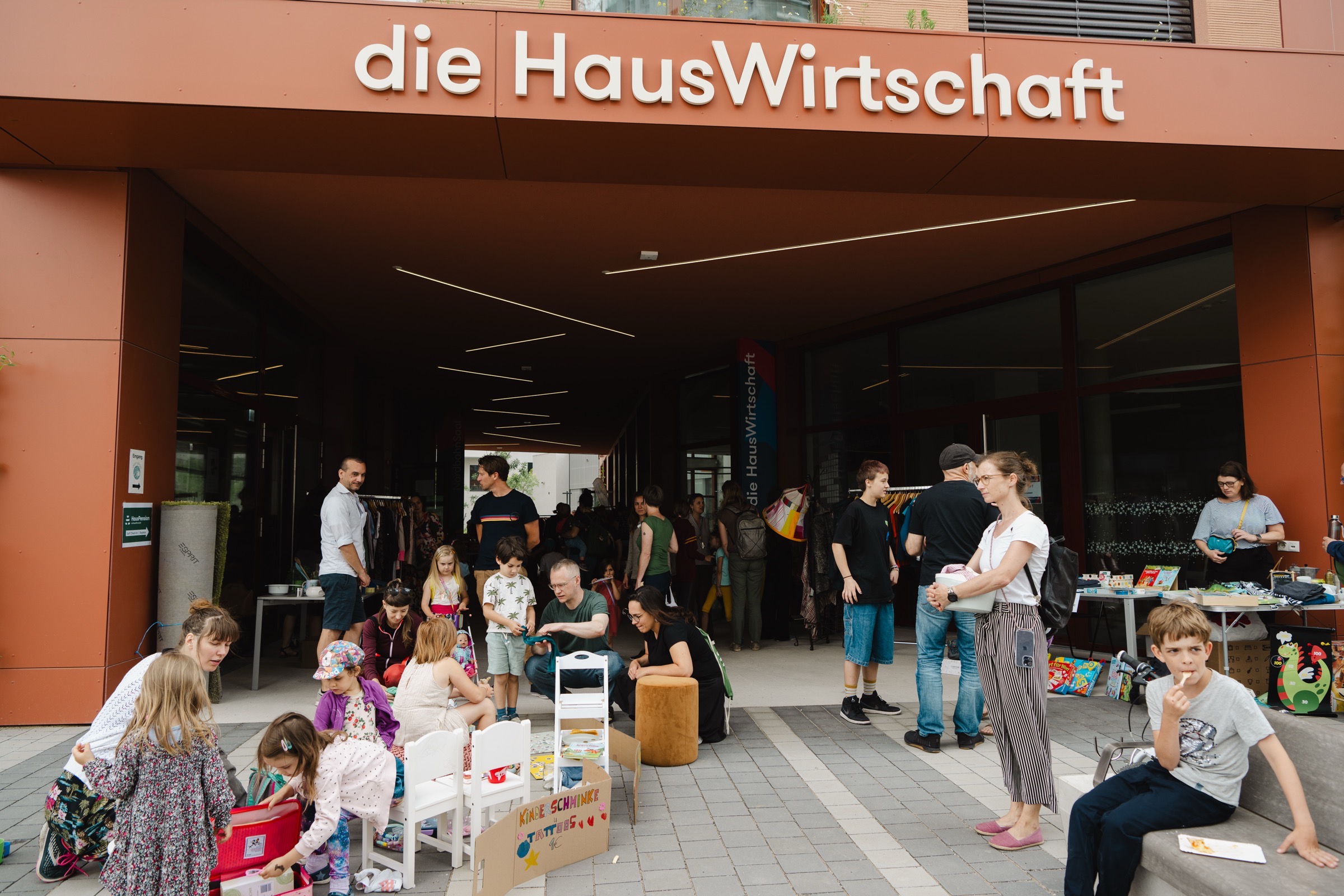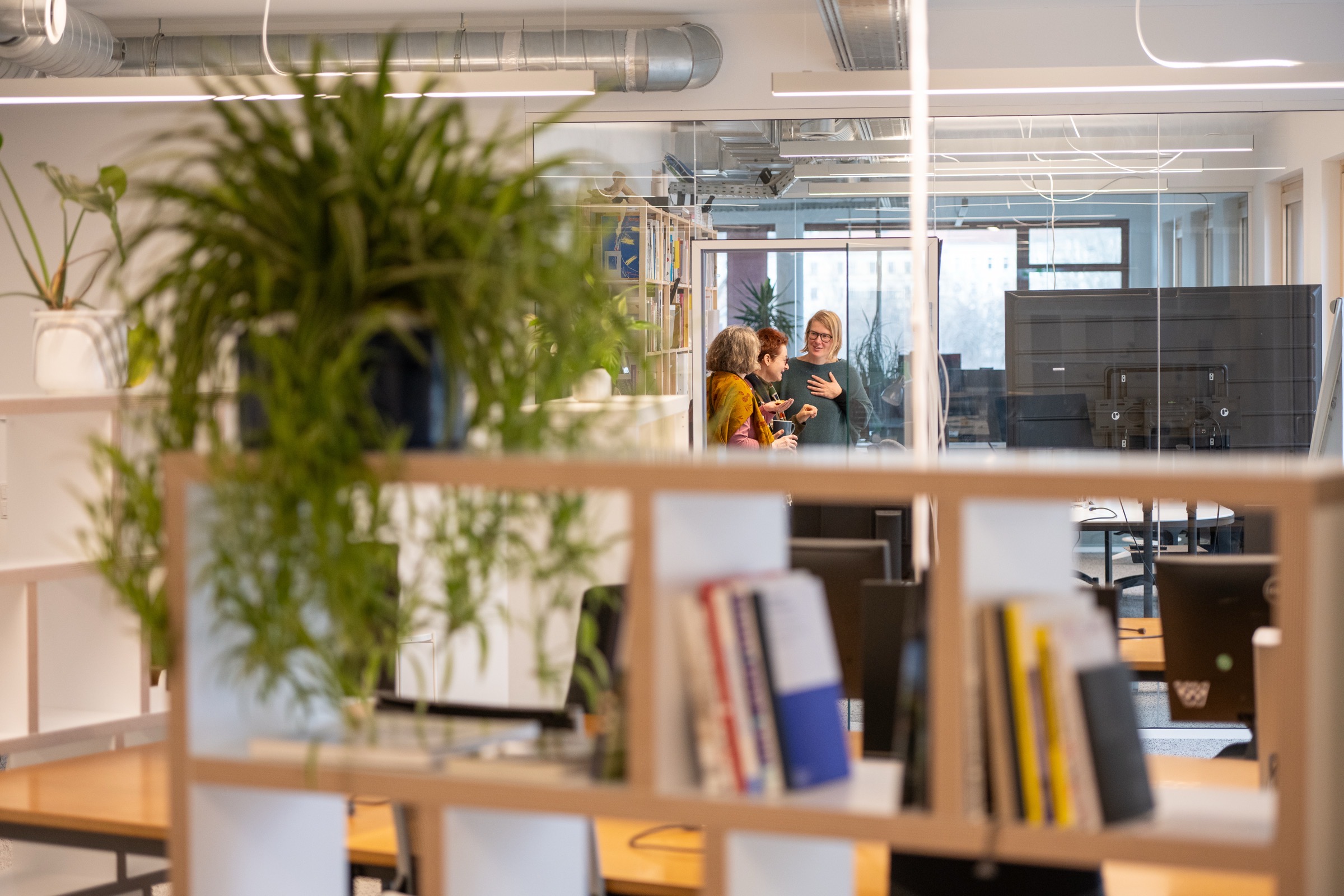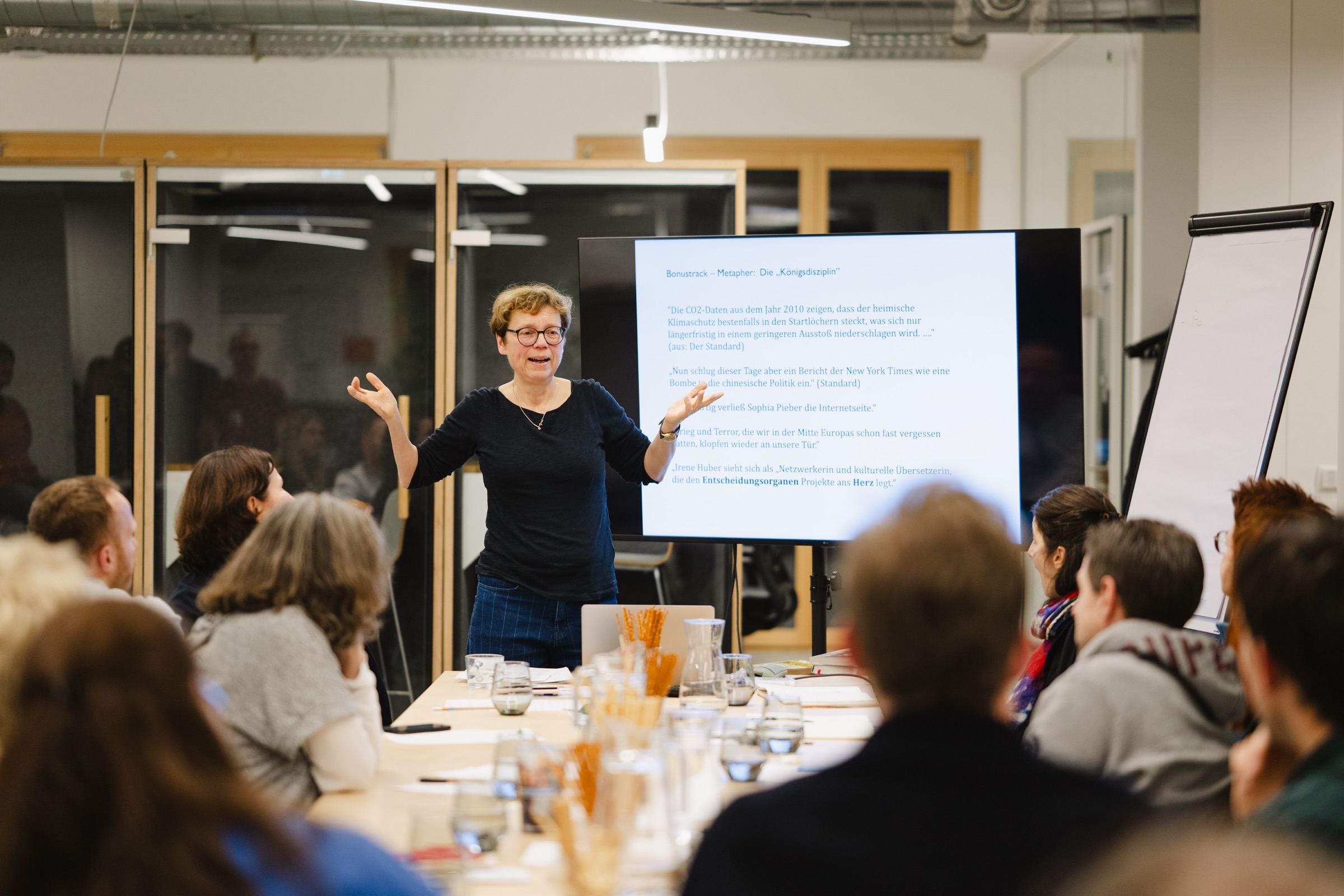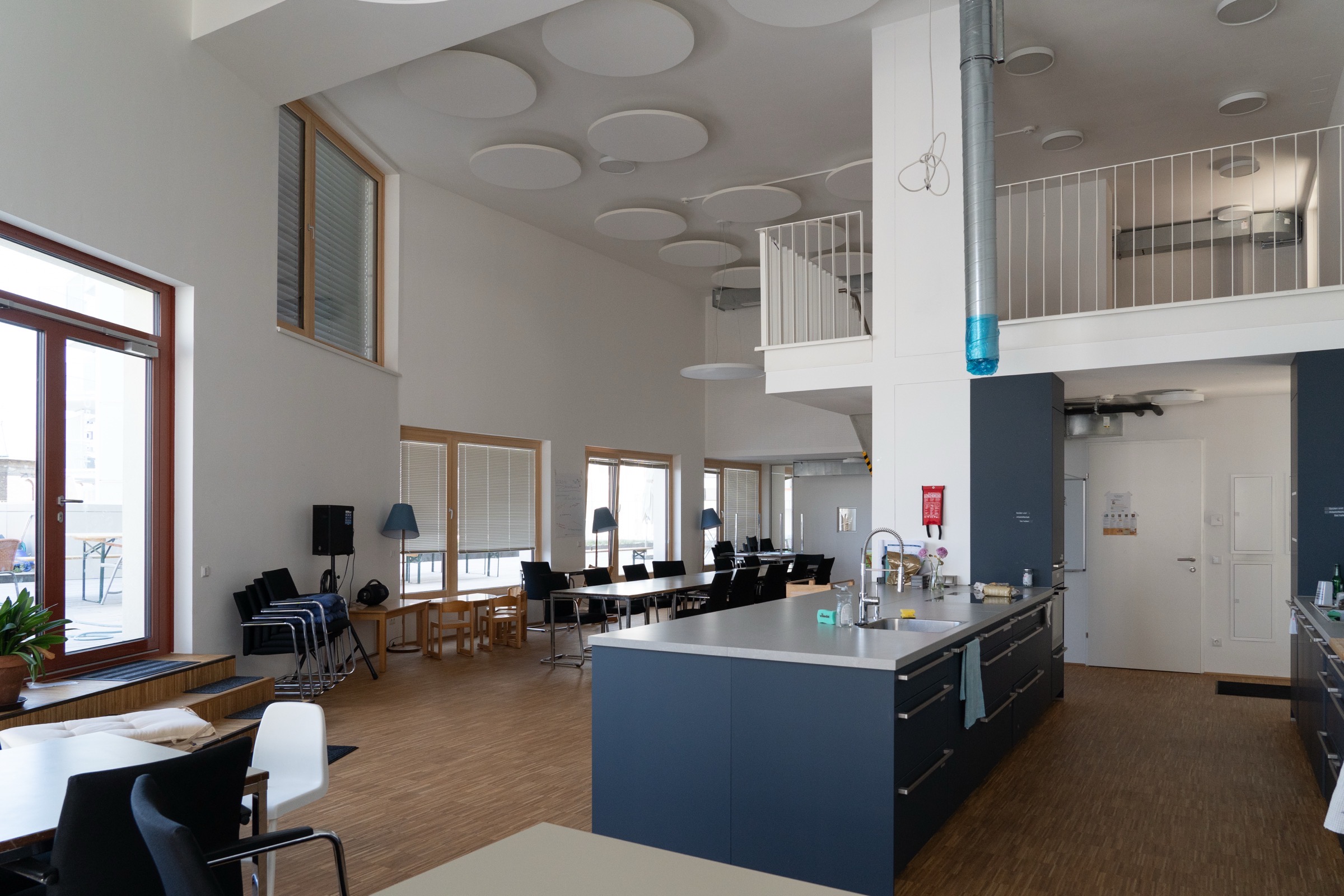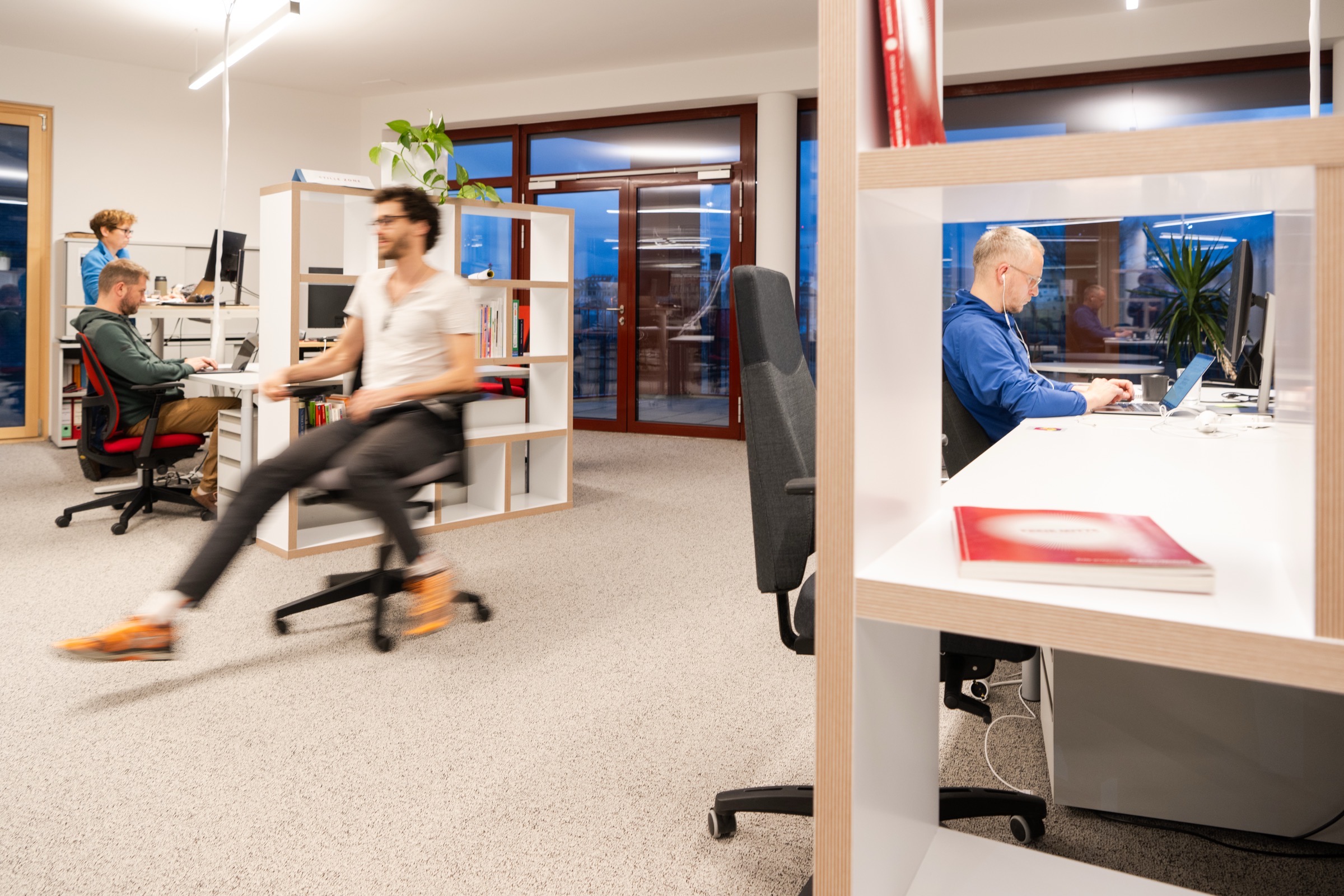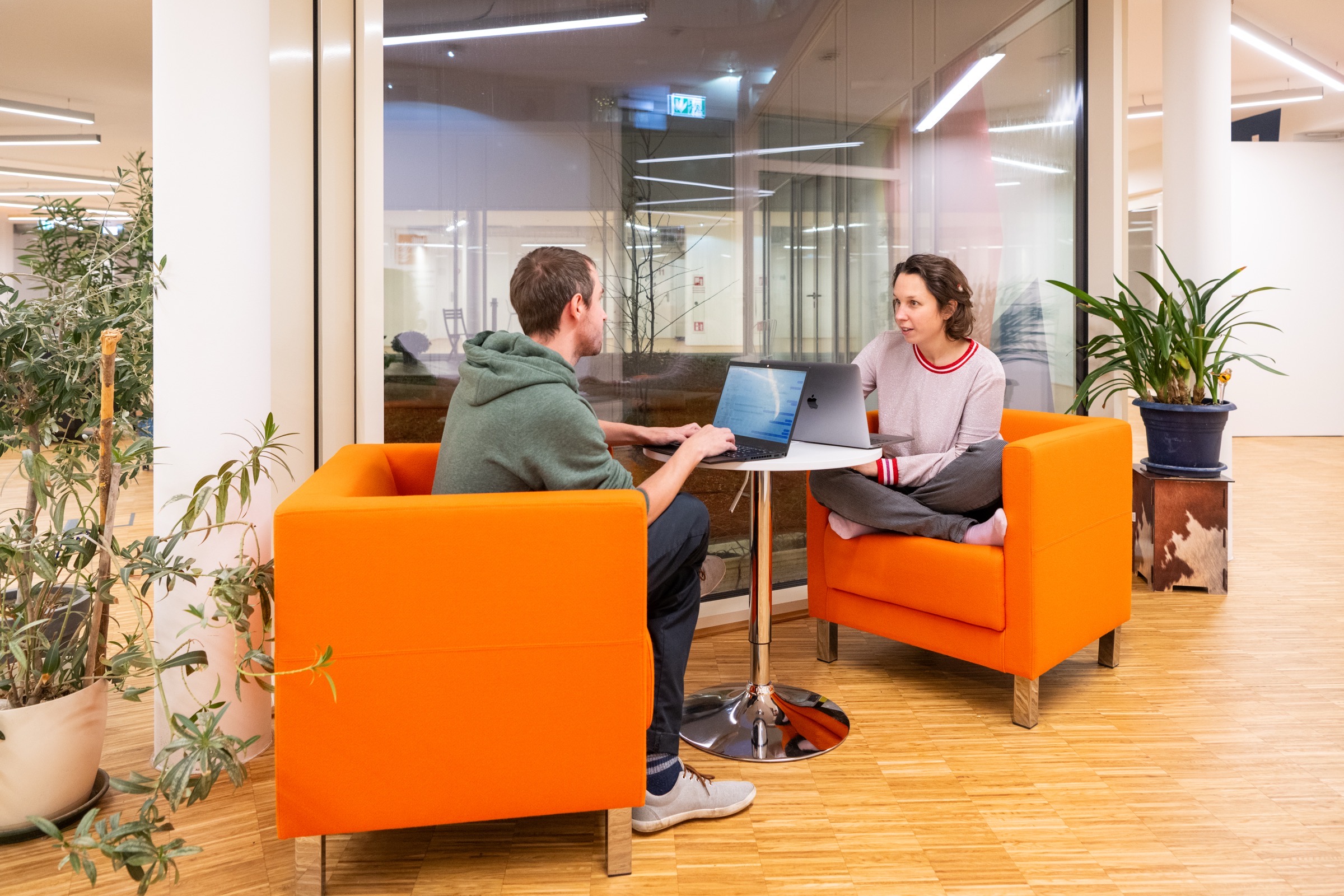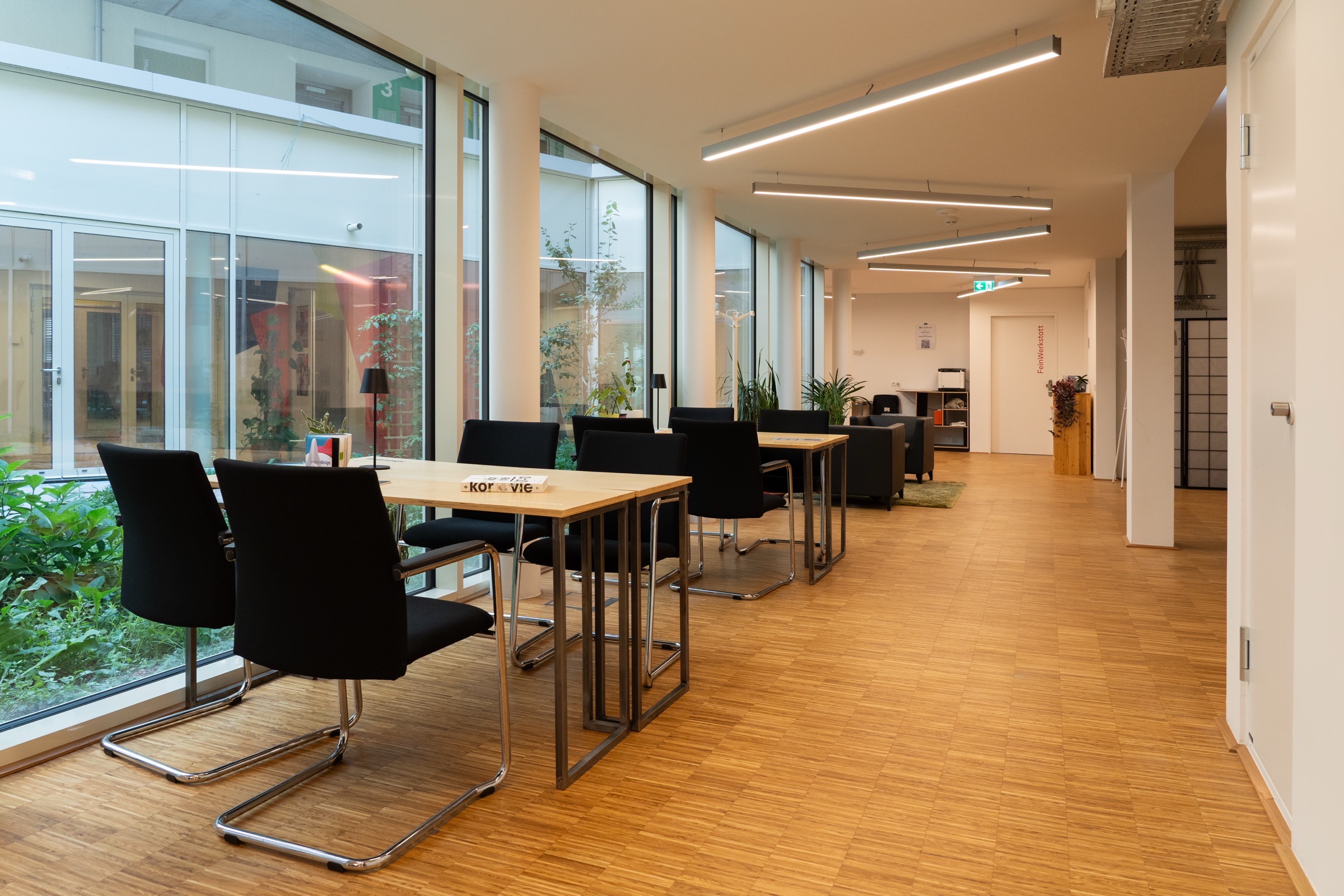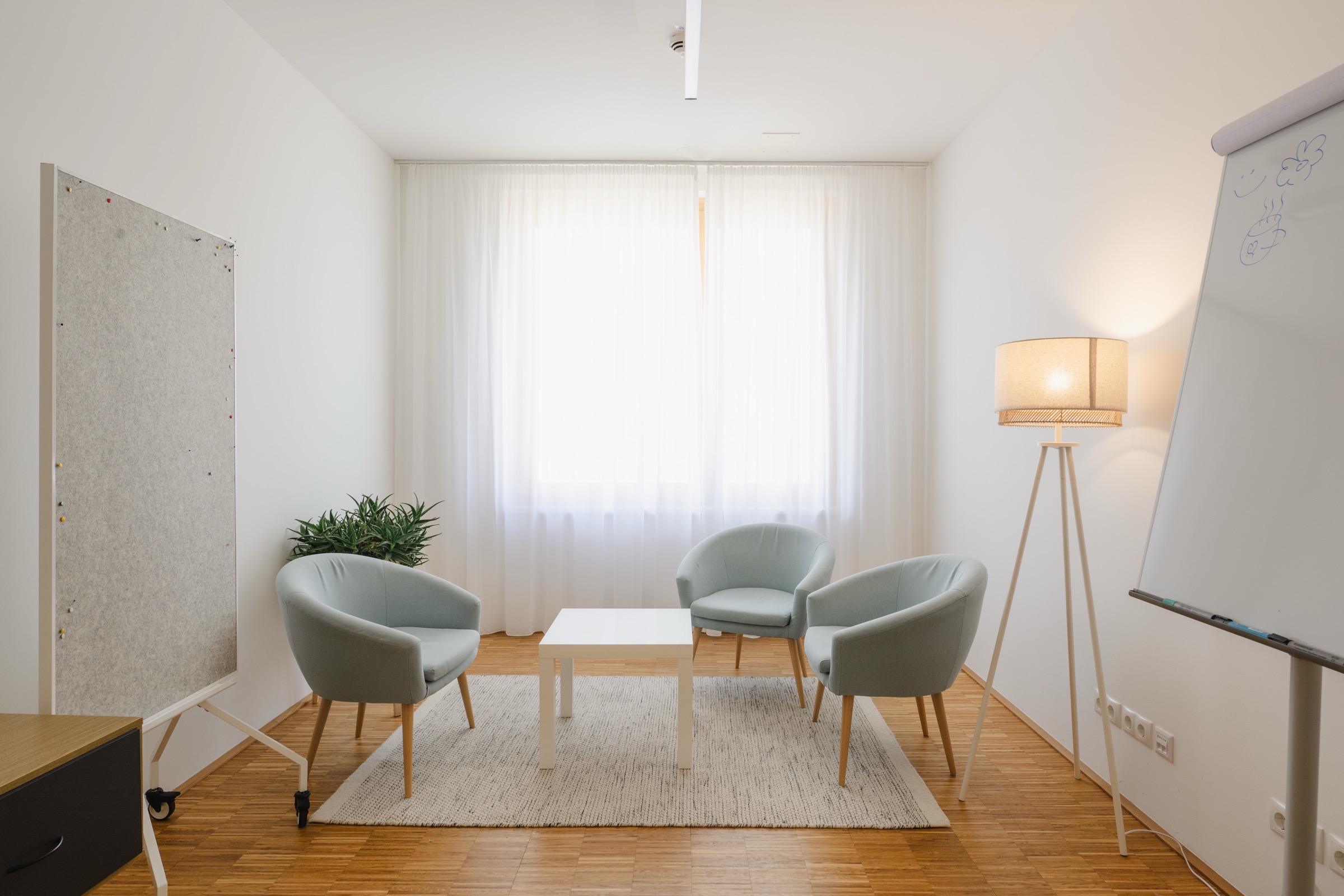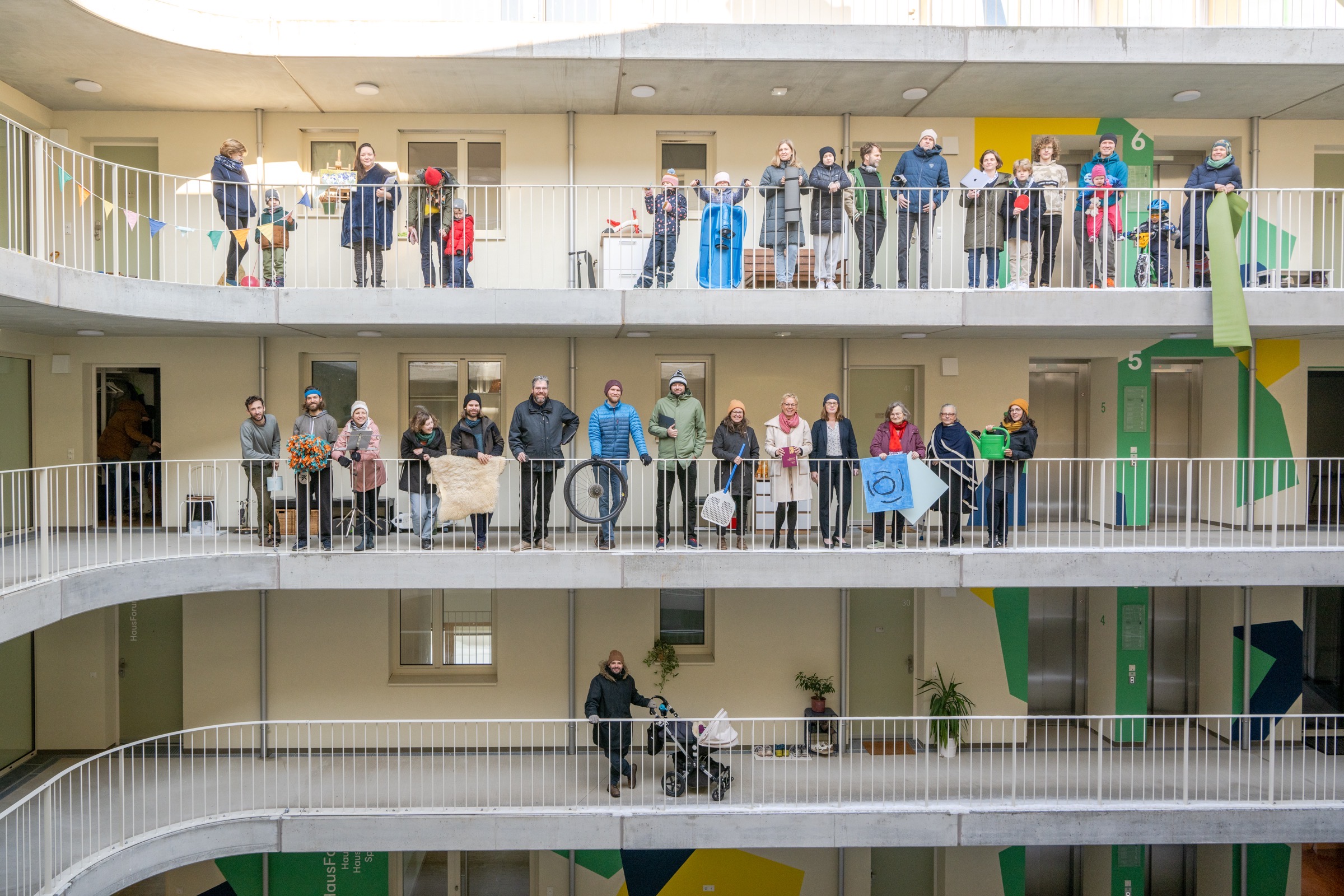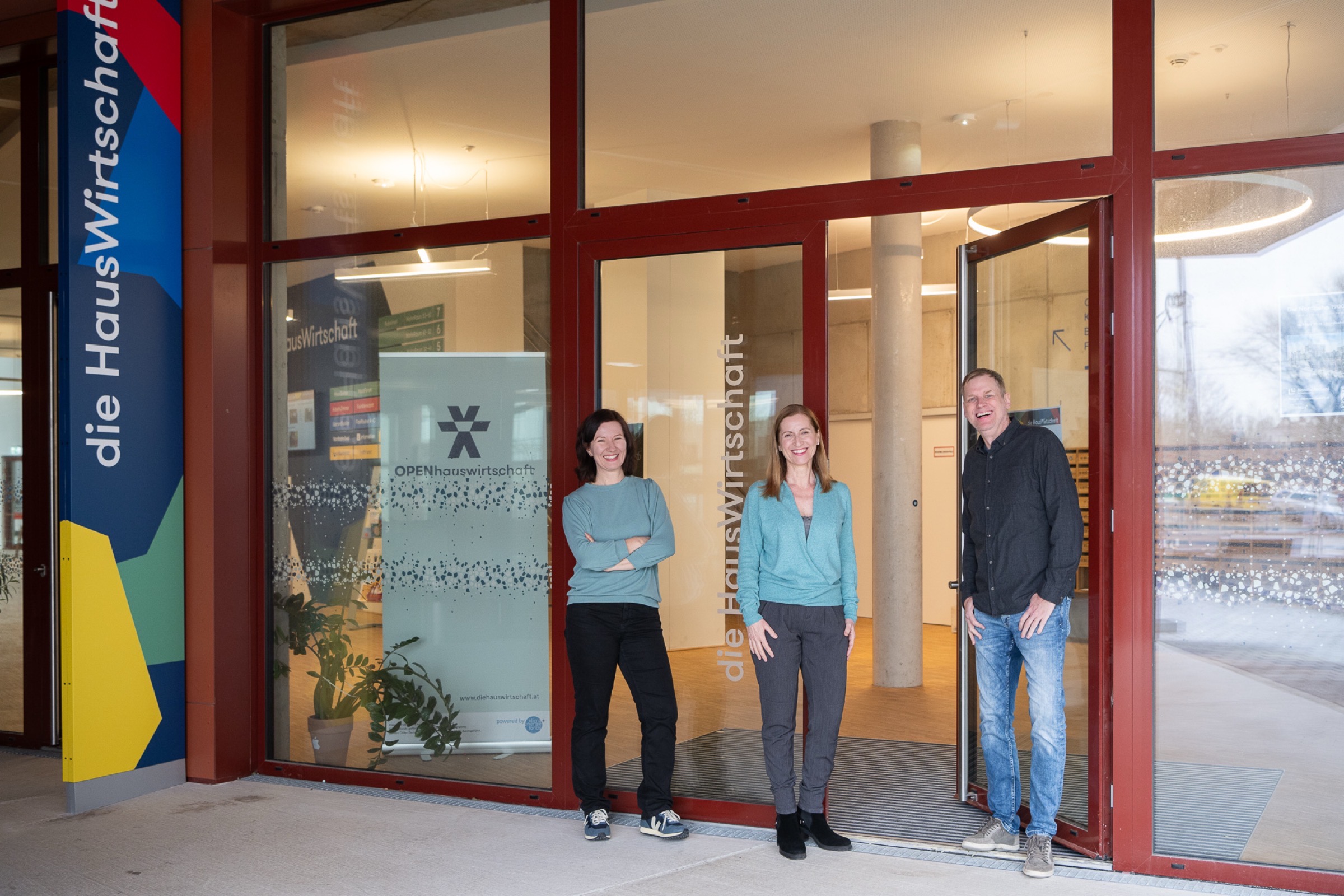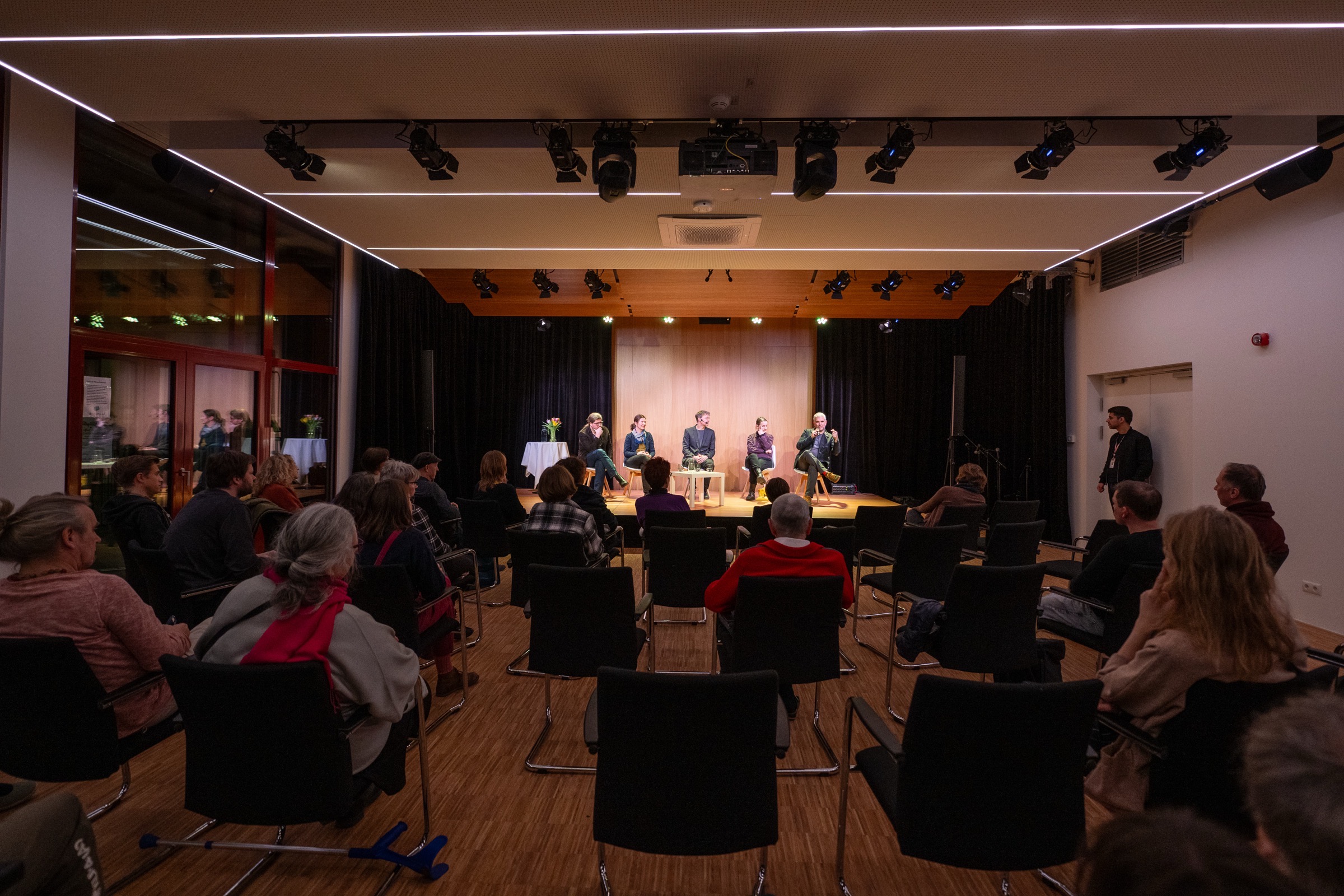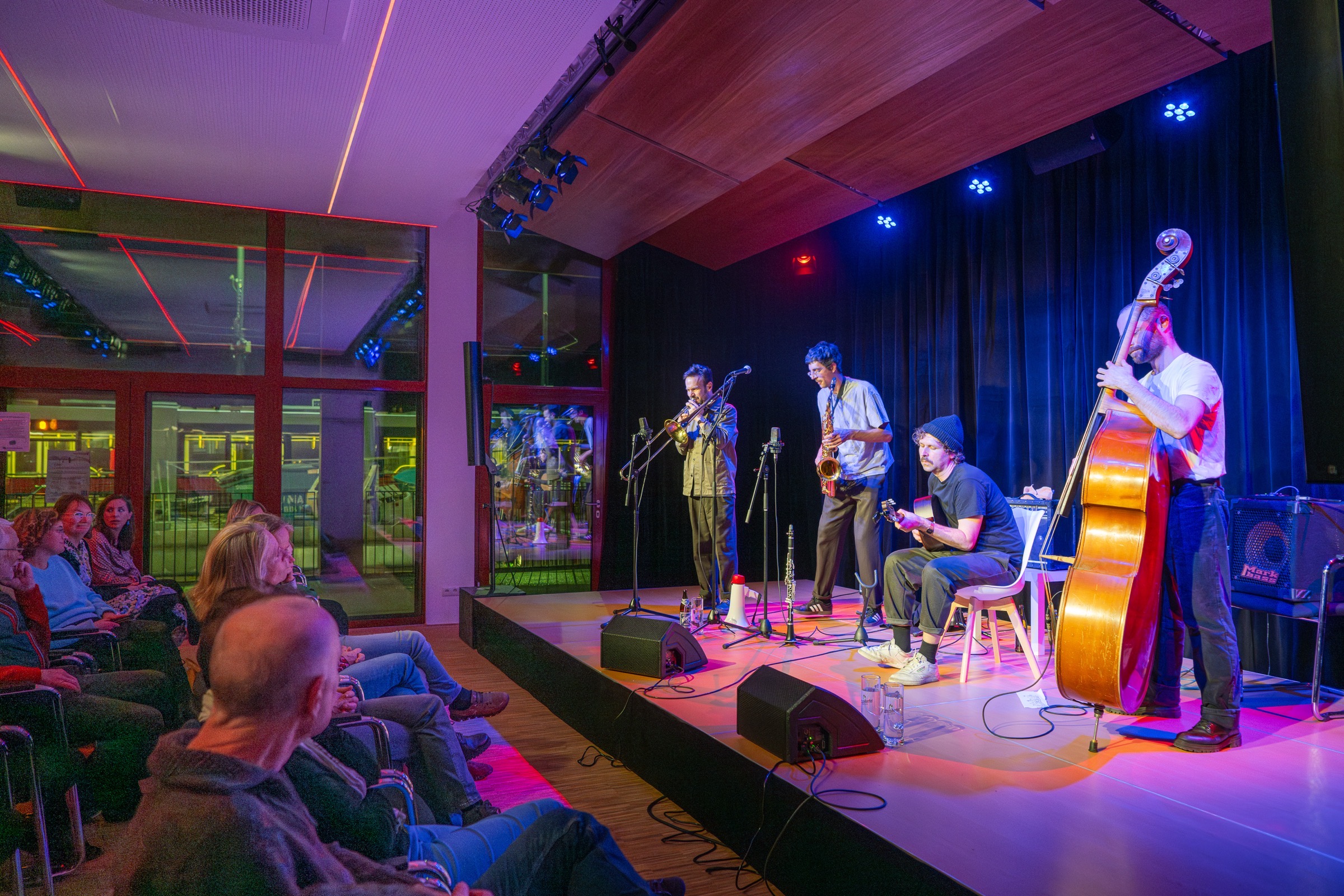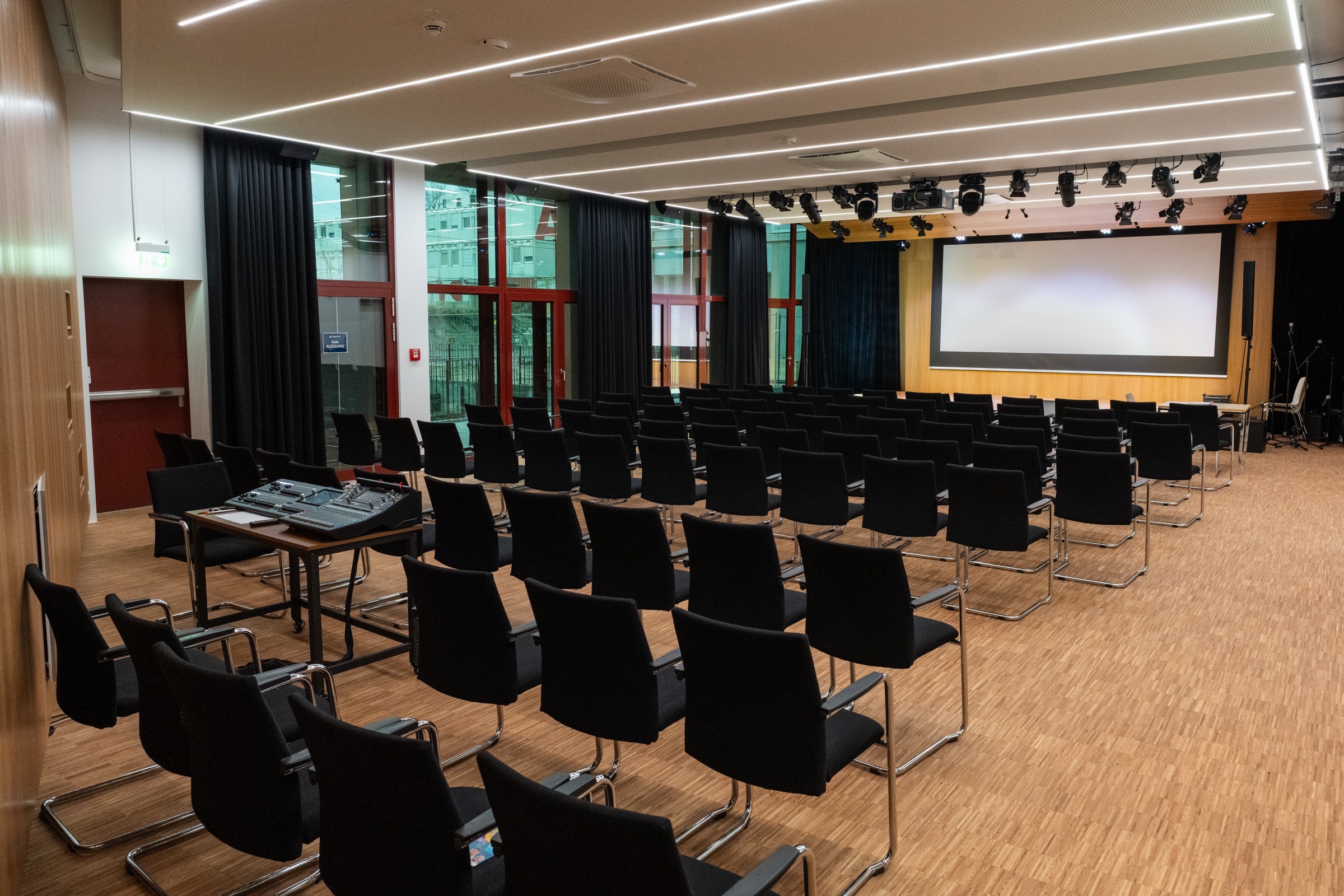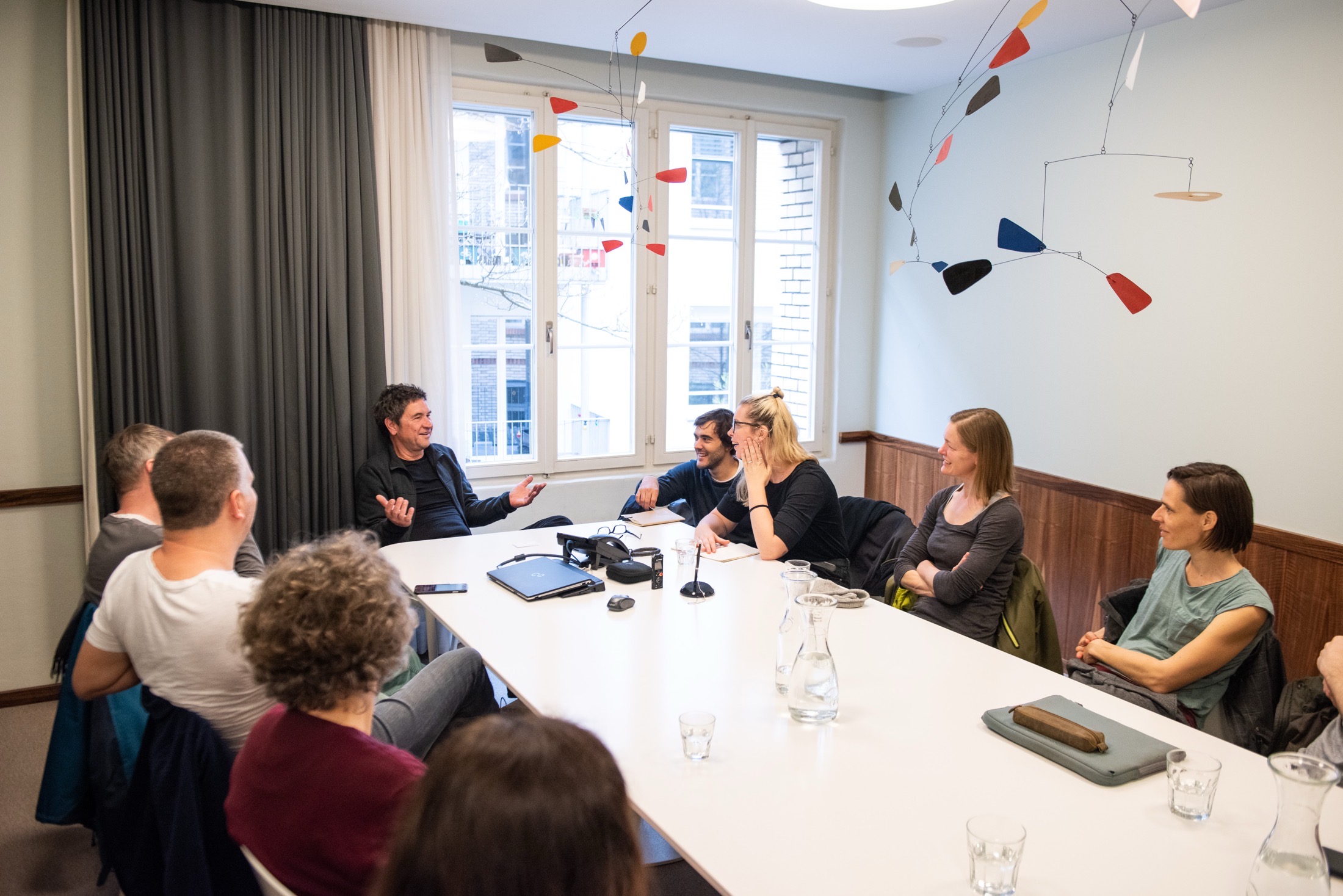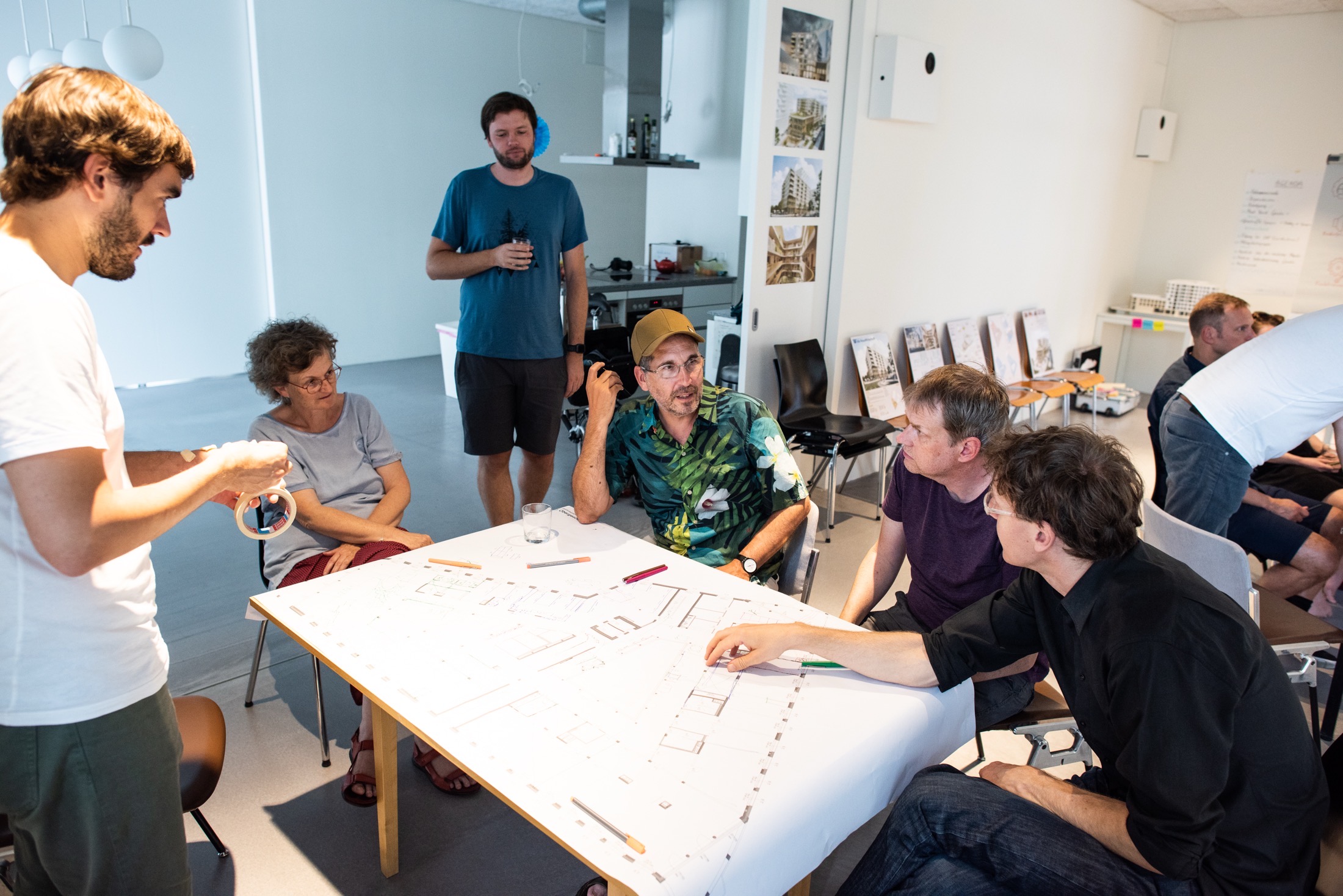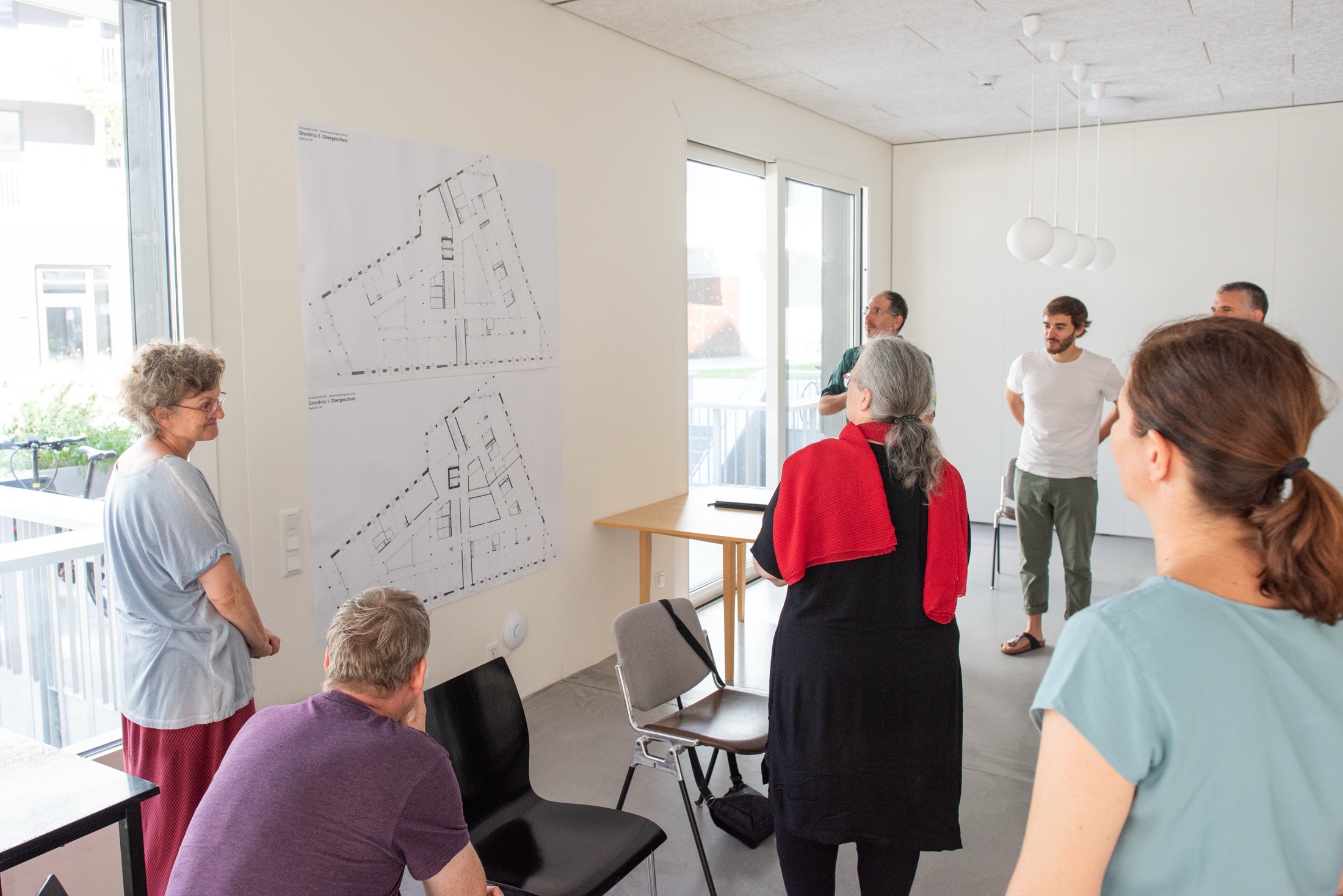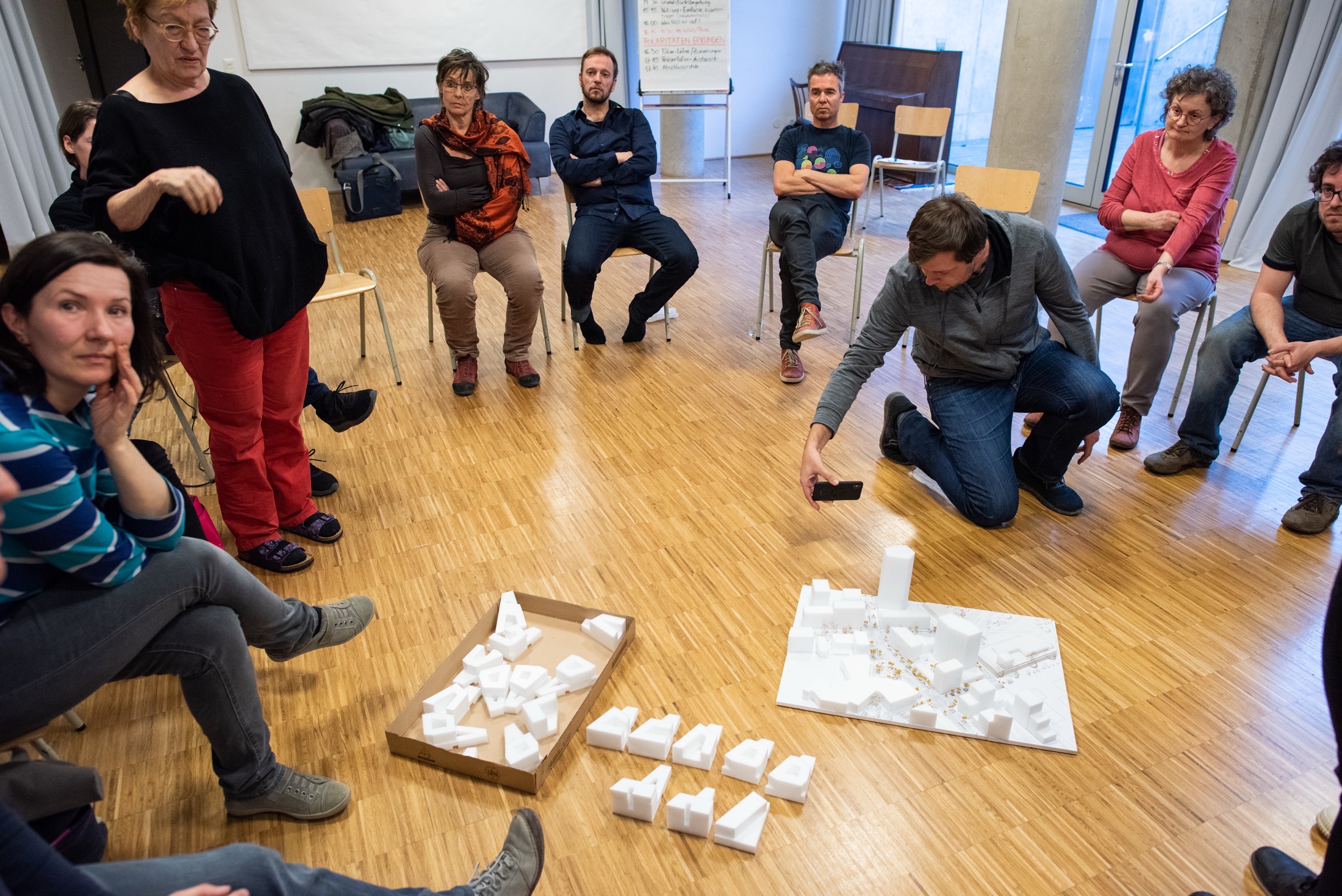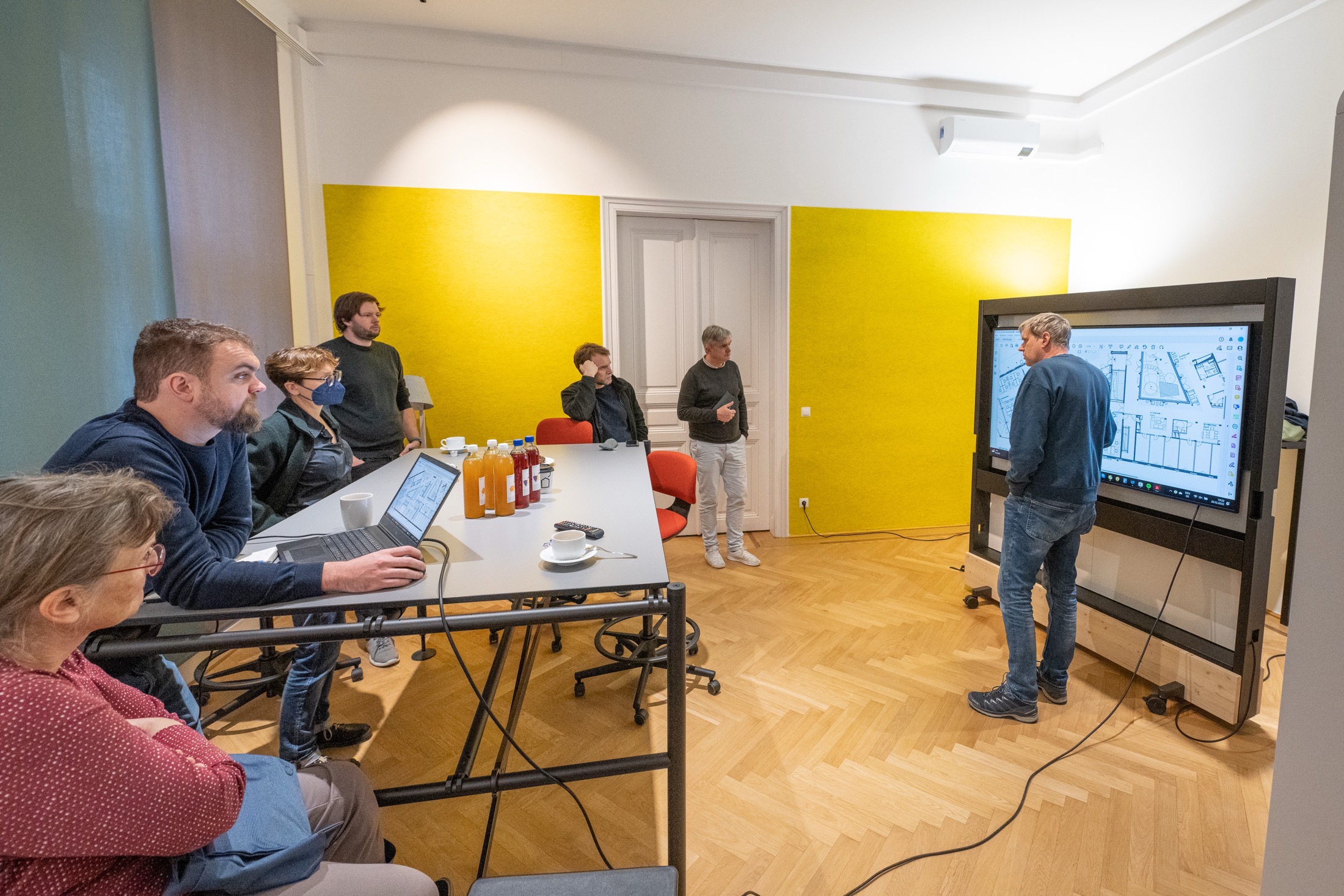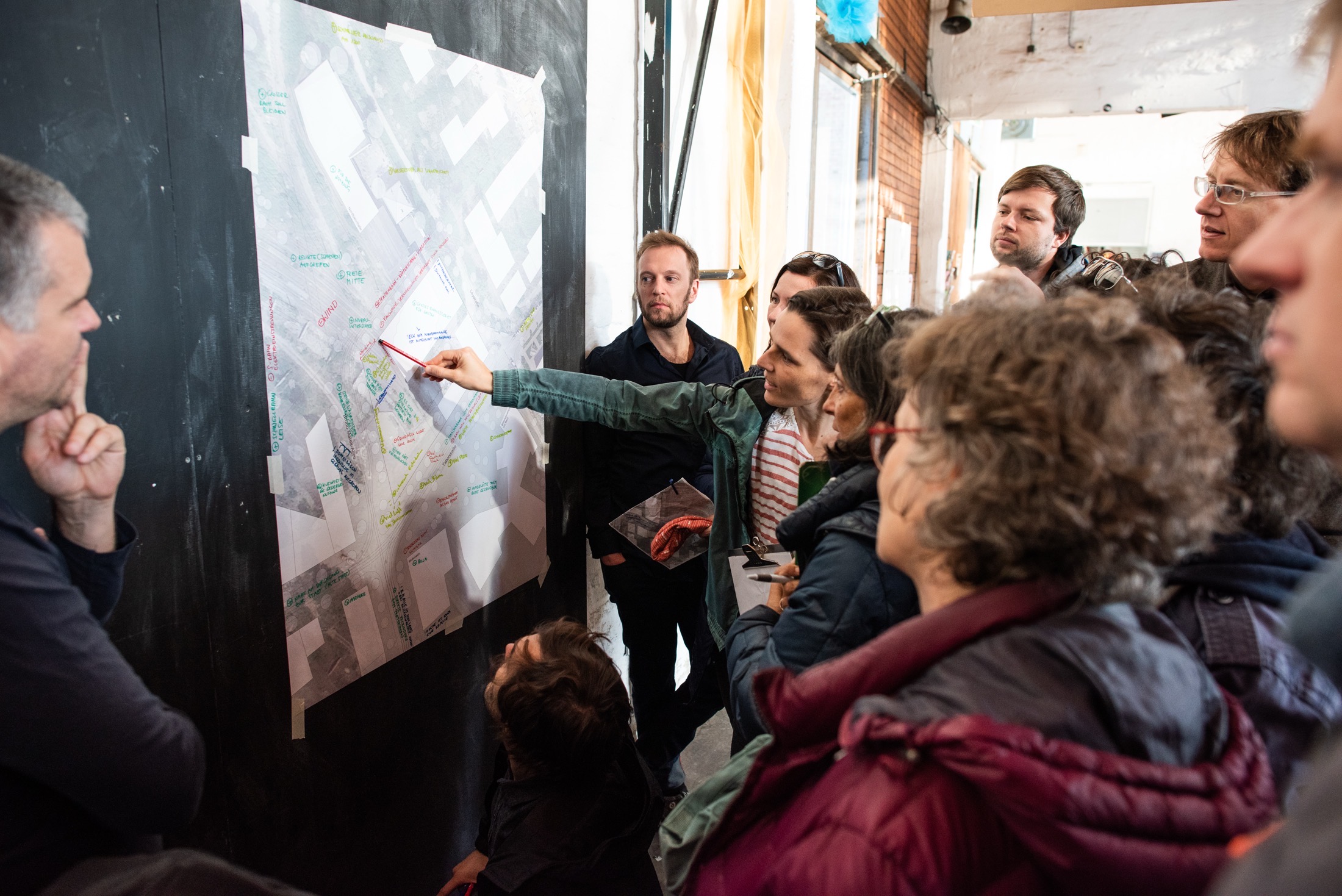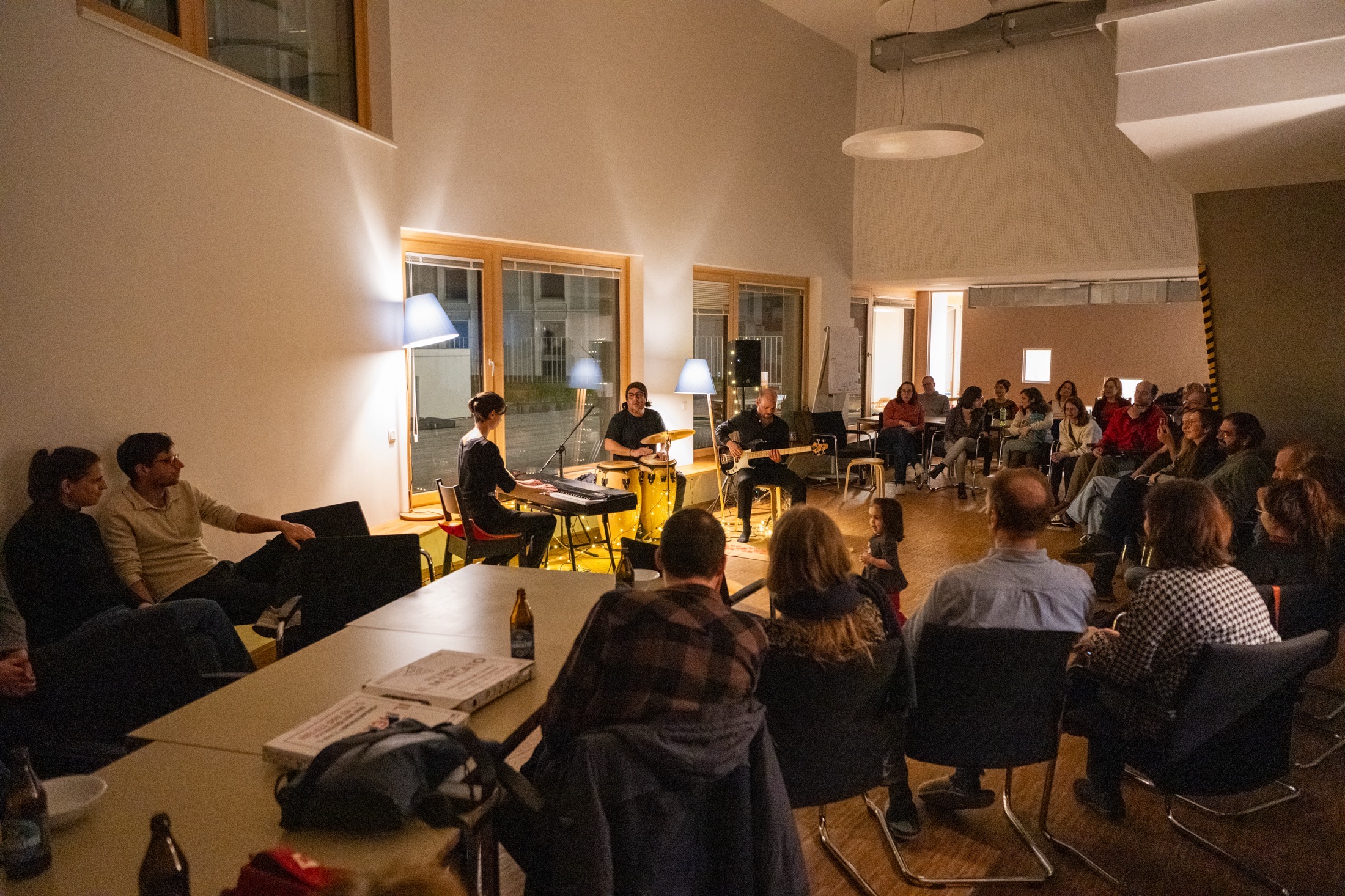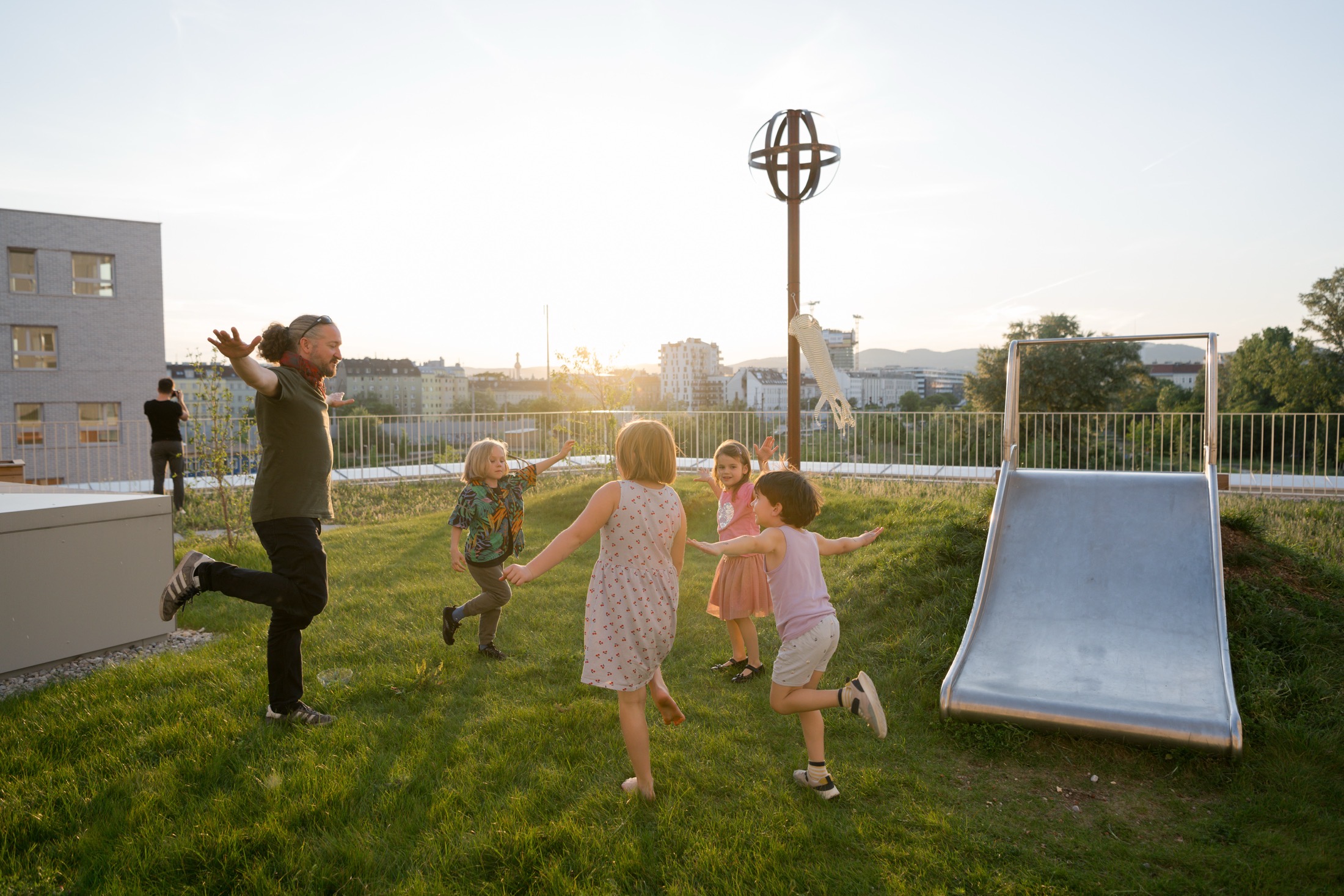Regaining a sense of belonging
die HausWirtschaft
die HausWirtschaft e.Gen. – Affordable Working and Living as Cooperative
"Die HausWirtschaft" combines participation, modern workspaces, and affordable housing. It’s organized as a cooperative that has been directly developed by its members. The building itself consists of 48 apartments for living, 9 guest rooms, multiple spacious community areas and 3,500 m² of work-related space. It includes therapy and meeting rooms, coworking areas, an event hall, and a bilingual kindergarten. A perfect place to live, work, collaborate and grow – as a business and an individual!
Austria
Local
Vienna, Nordbahnviertel.
Mainly urban
It refers to a physical transformation of the built environment (hard investment)
Yes
2024-01-26
No
No
Yes
Yes
Yes
As a representative of an organisation
“Die HausWirtschaft” is a radically mixed-use project with 1:1 balance between working and living uses. Built for 200+ people and small businesses, it is located in Vienna’s development area “Nordbahnhof”. The project fosters community building, entrepreneurial thinking and provides affordable workspaces & housing. Based on participatory planning, its members multidisciplinary worked together with architects, professional developers, urban planners & researchers.
As operating business, “Die HausWirtschaft” demonstrates that the cooperative business form is ideal for a radically mixed-use building type. Its structure not just guarantees participation, it also enables sharing in 3 dimensions: space, time, and tools. This cuts down the environmental impact, promotes circular economy practices, and ensures high utilization of valuable resources.
The project tackles emerging challenges of new work-life-models (time & financial pressure, belonging to a community, parenting, …). Key target groups are:
* Freelancers (ranging from therapists, over IT experts, to scientists) and self-employed people seeking affordable workspaces and a supportive community.
* Small businesses & startups looking for flexible and collaborative work environments.
* Individuals & families seeking affordable housing in a central location—in combination with a great remote work environment.
With its participatory planning process, a cooperative structure and the catalyst effect on the neighborhood–all in the context of Vienna’s affordable housing program– “die HausWirtschaft” is a role model of radical mixed-use. The project is a replicable and a vivid grassroot-component of the urban fabric, boosting local economy, reducing environmental footprints, and nurturing community-driven innovation. Overall, it paves the way for subsequent radically mixed-use developments, helping to build more vibrant cities that empower people and businesses alike – strengthening their sense of belonging.
As operating business, “Die HausWirtschaft” demonstrates that the cooperative business form is ideal for a radically mixed-use building type. Its structure not just guarantees participation, it also enables sharing in 3 dimensions: space, time, and tools. This cuts down the environmental impact, promotes circular economy practices, and ensures high utilization of valuable resources.
The project tackles emerging challenges of new work-life-models (time & financial pressure, belonging to a community, parenting, …). Key target groups are:
* Freelancers (ranging from therapists, over IT experts, to scientists) and self-employed people seeking affordable workspaces and a supportive community.
* Small businesses & startups looking for flexible and collaborative work environments.
* Individuals & families seeking affordable housing in a central location—in combination with a great remote work environment.
With its participatory planning process, a cooperative structure and the catalyst effect on the neighborhood–all in the context of Vienna’s affordable housing program– “die HausWirtschaft” is a role model of radical mixed-use. The project is a replicable and a vivid grassroot-component of the urban fabric, boosting local economy, reducing environmental footprints, and nurturing community-driven innovation. Overall, it paves the way for subsequent radically mixed-use developments, helping to build more vibrant cities that empower people and businesses alike – strengthening their sense of belonging.
Radically Mixed-Use
Cooperative Working & Living
Multi-Dimensional Sharing
Affordable Participative Housing
Participative Planning and Business Development
Sharing has always been considered in three dimensions: equipment and tools, floor space, and time. “Die HausWirtschaft”’s idea of operating the whole building as a cooperative enables comprehensive sharing of resources at every level. The working space and the living space are thus under common administration. The project optimizes the usage of available spaces—including offices; therapy-, seminar- and meeting rooms; an event area; and workshops—by creating a continuous internal and external demand, ensuring near-continuous use. This reduces per-capita energy and space consumption, as no single user needs dedicated facilities that remain idle. This would not be possible in a traditional building, where multiple operators would have conflicts of interest and space would be treated just from a commercial, but not from an overall perspective.
Moreover, tools, hardware, and software are purchased and managed collectively by the members. Shared infrastructure—such as large-format printers, specialized equipment, and a common IT systems—eliminate redundant purchases, lowering costs & environmental impact.
The building itself was planned and constructed as a zero-energy house (Niedrigstenergiehaus). The thermal energy supply is provided through district heating and cooling. Photovoltaic installations help to reduce the external power demand to a minimum, since the continuous utilization over the day allows local power consumtion. Using awareness campaigns and community activities, the general waste could be reduced by 50% compared to Vienna’s standard.
A circular economy ethos guides maintenance and replacement cycles, extending item’s lifecycles. The overall affordability is secured by operating within Vienna’s subsidized housing framework, ensuring reduced expenses for members. Through its integrated approach of shared spaces, cooperative ownership, and participatory planning, “Die HausWirtschaft” provides a replicable model for sustainable urban development.
Moreover, tools, hardware, and software are purchased and managed collectively by the members. Shared infrastructure—such as large-format printers, specialized equipment, and a common IT systems—eliminate redundant purchases, lowering costs & environmental impact.
The building itself was planned and constructed as a zero-energy house (Niedrigstenergiehaus). The thermal energy supply is provided through district heating and cooling. Photovoltaic installations help to reduce the external power demand to a minimum, since the continuous utilization over the day allows local power consumtion. Using awareness campaigns and community activities, the general waste could be reduced by 50% compared to Vienna’s standard.
A circular economy ethos guides maintenance and replacement cycles, extending item’s lifecycles. The overall affordability is secured by operating within Vienna’s subsidized housing framework, ensuring reduced expenses for members. Through its integrated approach of shared spaces, cooperative ownership, and participatory planning, “Die HausWirtschaft” provides a replicable model for sustainable urban development.
Participatory design and commoning is the outstanding driver of the project. The co-design process resulted in a building that is uniquely suited to the HausWirtschaft community's needs–combining working and living–with a flexible and functionally diverse architecture.
Residents and small businesses co-designed the building with the experienced team of einszueins Architektur to ensure flexibly usable, visually appealing, functional spaces. By weaving together living, working, and cultural use, the building’s architecture fosters spontaneous interaction, communication and creativity. Large multipurpose rooms, and flexible common areas provide space for events, gatherings, and exhibitions, elevating the daily experience of residents and visitors alike.
Through thoughtful spatial connections and functional crossings, the building becomes a comfortable, inspiring place to live and work. This approach is exemplary because it shows how attention to detail , beauty of design, practicality, and cultural vibrancy can coexist in a cooperative model that encourages social cohesion, inclusivity, and a shared sense of ownership.
Residents and small businesses co-designed the building with the experienced team of einszueins Architektur to ensure flexibly usable, visually appealing, functional spaces. By weaving together living, working, and cultural use, the building’s architecture fosters spontaneous interaction, communication and creativity. Large multipurpose rooms, and flexible common areas provide space for events, gatherings, and exhibitions, elevating the daily experience of residents and visitors alike.
Through thoughtful spatial connections and functional crossings, the building becomes a comfortable, inspiring place to live and work. This approach is exemplary because it shows how attention to detail , beauty of design, practicality, and cultural vibrancy can coexist in a cooperative model that encourages social cohesion, inclusivity, and a shared sense of ownership.
General affordability is ensured by Vienna’s subsidized housing system and the cooperative organization, guaranteeing cost-effective spaces for residents, freelancers, and small businesses.
Nearly all shared spaces are accessible not only to residents and members, but also to the wider neighborhood and external companies. A bilingual kindergarten further supports the life of local families and ensures people of all ages are populating “Die HausWirtschaft” with life. Barrier-free design and thinking ensures not only physical accessibility for all, but also an integrative community.
HausWirtschaft has Sociocracy as the fundamental governance model. This empowers every member by equal voting rights and each voice to be heard. Collective ownership of tools and infrastructure reduces financial burdens for individuals, fostering mutual support and resource efficiency. By creating flexible, multi-use spaces open to residents and neighbors alike, HausWirtschaft becomes a local hub that strengthens community ties and especially amplifies neighborhood initiatives. With “Nordstern”, a culture initiative emerged from HausWirtschaft, plays a central role in the cultural life of Vienna’s Nordbahnviertel. “Nordstern” organizes bi-weekly cultural events, ranging from film screenings, over music performances and exhibitions, to theater plays–all under a “pay as you wish” pricing model, to ensure openness for everyone.
This inclusive, mixed-use approach serves as a model for socially sustainable urban development, linking housing, work, and social life under one roof. As such, Die HausWirtschaft stands as an exemplary blueprint for an equitable, vibrant, and accessible city environment.
Nearly all shared spaces are accessible not only to residents and members, but also to the wider neighborhood and external companies. A bilingual kindergarten further supports the life of local families and ensures people of all ages are populating “Die HausWirtschaft” with life. Barrier-free design and thinking ensures not only physical accessibility for all, but also an integrative community.
HausWirtschaft has Sociocracy as the fundamental governance model. This empowers every member by equal voting rights and each voice to be heard. Collective ownership of tools and infrastructure reduces financial burdens for individuals, fostering mutual support and resource efficiency. By creating flexible, multi-use spaces open to residents and neighbors alike, HausWirtschaft becomes a local hub that strengthens community ties and especially amplifies neighborhood initiatives. With “Nordstern”, a culture initiative emerged from HausWirtschaft, plays a central role in the cultural life of Vienna’s Nordbahnviertel. “Nordstern” organizes bi-weekly cultural events, ranging from film screenings, over music performances and exhibitions, to theater plays–all under a “pay as you wish” pricing model, to ensure openness for everyone.
This inclusive, mixed-use approach serves as a model for socially sustainable urban development, linking housing, work, and social life under one roof. As such, Die HausWirtschaft stands as an exemplary blueprint for an equitable, vibrant, and accessible city environment.
By actively involving citizens and civil society in developing a radically mixed-use building from the beginning, “Die HausWirtschaft” has created a truly community-driven project. From the first idea in early 2016, it engaged civil society via local residents, neighborhood communities, professional stakeholders, urban planning scientists and in its participatory approach.
The initial idea itself was born on a small networking event for citizens of the future neighborhood. Compared to commercially driven developments, the founding team used grassroots tactics to convince an established non-profit developer (“EGW”) to take the risk of building a radically mixed-use building.
We can further describe involvement into two phases:
Early & Planning Stage Involvement: Future residents and tenants co-designed and actively participated in workshops, shaping the building's architecture alongside the team of einszueins Architektur. This ensured the space catered to the community's specific needs, business plan considerations and residents’ preferences. Feedback of the future neighborhood’s community had been gathered in surveys and in-person feedback sessions called “Echoräume”.
Ongoing Participation: The cooperative structure empowers members with decision-making authority. It keeps the group open to new members and allows every individual or company to join. This results in a cohesive and supportive community of residents and businesses. Regular community events foster a sense of belonging and provide opportunities for neighbors to contribute and get engaged.
Overall, the project demonstrates how bottom-up participation leads to finacially and socially sustainable development and offers a replicable blueprint for other urban areas.
The initial idea itself was born on a small networking event for citizens of the future neighborhood. Compared to commercially driven developments, the founding team used grassroots tactics to convince an established non-profit developer (“EGW”) to take the risk of building a radically mixed-use building.
We can further describe involvement into two phases:
Early & Planning Stage Involvement: Future residents and tenants co-designed and actively participated in workshops, shaping the building's architecture alongside the team of einszueins Architektur. This ensured the space catered to the community's specific needs, business plan considerations and residents’ preferences. Feedback of the future neighborhood’s community had been gathered in surveys and in-person feedback sessions called “Echoräume”.
Ongoing Participation: The cooperative structure empowers members with decision-making authority. It keeps the group open to new members and allows every individual or company to join. This results in a cohesive and supportive community of residents and businesses. Regular community events foster a sense of belonging and provide opportunities for neighbors to contribute and get engaged.
Overall, the project demonstrates how bottom-up participation leads to finacially and socially sustainable development and offers a replicable blueprint for other urban areas.
Local:
* Future Residents & Tenants: were actively involved in the co-design process, ensuring the building met their specific needs and preferences.
* Local Businesses: Feedback and collaboration with local businesses ensured the project's integration with the surrounding community from day one. "Die HausWirtschaft" was significantly involved in the founding of a shopping street association before it even moved in the building, bringing in important voices into the development process.
* Neighborhood Initiatives: The project actively participated in discussions and initiatives related to the surrounding Nordbahnviertel, ensuring alignment with the area's overall vision and goals.
Regional:
* Property Developer: The limited-profit housing company EGW acted as a key financing partner and advisor in the whole development. This brought in important knowledge about Vienna’s subsidized housing model and guaranteed financial stability during the development phase. On the hand, EGW profited from the group’s knowledge, engagement and voluntary work, which brought fresh wind into its established structures.
* City of Vienna / IBA_Wien: “Die HausWirtschaft” has been acknowledged as project in the International Building Exhibition Vienna 2022 as showcase for “New Social Housing”. The City of Vienna helped to promote international networking, making HausWirtschaft’s process and structure a showcase project even before its completion.
National:
* Austrian Climate and Energy Fund: Under the name “OPENhauswirtschaft” the Austrian “Klimafonds” supported the scientific support and documentation of the development process. Essential experiences and findings are thus made available via scientific publications to a broad specialist audience.
EU: "Die HausWirtschaft" has been one of the finalist projects in the European Innovation Council's 2022 EUSIC challenge ‘the future of living, innovation for affordable, and sustainable housing districts.
* Future Residents & Tenants: were actively involved in the co-design process, ensuring the building met their specific needs and preferences.
* Local Businesses: Feedback and collaboration with local businesses ensured the project's integration with the surrounding community from day one. "Die HausWirtschaft" was significantly involved in the founding of a shopping street association before it even moved in the building, bringing in important voices into the development process.
* Neighborhood Initiatives: The project actively participated in discussions and initiatives related to the surrounding Nordbahnviertel, ensuring alignment with the area's overall vision and goals.
Regional:
* Property Developer: The limited-profit housing company EGW acted as a key financing partner and advisor in the whole development. This brought in important knowledge about Vienna’s subsidized housing model and guaranteed financial stability during the development phase. On the hand, EGW profited from the group’s knowledge, engagement and voluntary work, which brought fresh wind into its established structures.
* City of Vienna / IBA_Wien: “Die HausWirtschaft” has been acknowledged as project in the International Building Exhibition Vienna 2022 as showcase for “New Social Housing”. The City of Vienna helped to promote international networking, making HausWirtschaft’s process and structure a showcase project even before its completion.
National:
* Austrian Climate and Energy Fund: Under the name “OPENhauswirtschaft” the Austrian “Klimafonds” supported the scientific support and documentation of the development process. Essential experiences and findings are thus made available via scientific publications to a broad specialist audience.
EU: "Die HausWirtschaft" has been one of the finalist projects in the European Innovation Council's 2022 EUSIC challenge ‘the future of living, innovation for affordable, and sustainable housing districts.
“Die HausWirtschaft” reflects diverse disciplines, ensuring a holistic approach:
Architecture & Urban Planning: einszueins Architektur translated the community's vision into a functional and aesthetically pleasing design. Collaboration with urban planners & researchers ensured integration within the overall Nordbahnviertel development.
Finance & Cooperative Law: Experts of a limited-profit housing developer and lawyers designed contracts for a viable ownership and funding structure within Vienna’s subsidized housing framework. Multiple new legal areas were explored and contractual problems solved.
Social Sciences, New Work & Community Development: Experts in community development (e.g. realitylab) facilitated workshops and guided fostering a sense of belonging and community. The project drew inspiration from co-housing models and the New Work movement, e.g. by visiting multiple community-driven coworking and innovative working spaces in the DACH-region.
Sustainability & Environmental Studies: Sustainable practices were integrated throughout, drawing on knowledge from environmental studies and circular economy experts. Together with the heating, ventilating and air-conditioning planning team, the group articulated their needs and requirements for a modern building technology system in an collaborative workshop. To reduce waste, a waste management expert–who is also member of the cooperative–gave vital insights into operational life cycles and processes.
Business & Entrepreneurship: The project's focus on supporting (very) small businesses and founders required expertise in business development. The founding group spoke with the local Chamber of Commerce, various experts on small businesses and small-scale business models. So HausWirtschaft could target the specific needs of small businesses and self-employed persons.
IT & Digital Innovation: The whole building is operated under a single IT infrastructure, combinding working and living requirements.
Architecture & Urban Planning: einszueins Architektur translated the community's vision into a functional and aesthetically pleasing design. Collaboration with urban planners & researchers ensured integration within the overall Nordbahnviertel development.
Finance & Cooperative Law: Experts of a limited-profit housing developer and lawyers designed contracts for a viable ownership and funding structure within Vienna’s subsidized housing framework. Multiple new legal areas were explored and contractual problems solved.
Social Sciences, New Work & Community Development: Experts in community development (e.g. realitylab) facilitated workshops and guided fostering a sense of belonging and community. The project drew inspiration from co-housing models and the New Work movement, e.g. by visiting multiple community-driven coworking and innovative working spaces in the DACH-region.
Sustainability & Environmental Studies: Sustainable practices were integrated throughout, drawing on knowledge from environmental studies and circular economy experts. Together with the heating, ventilating and air-conditioning planning team, the group articulated their needs and requirements for a modern building technology system in an collaborative workshop. To reduce waste, a waste management expert–who is also member of the cooperative–gave vital insights into operational life cycles and processes.
Business & Entrepreneurship: The project's focus on supporting (very) small businesses and founders required expertise in business development. The founding group spoke with the local Chamber of Commerce, various experts on small businesses and small-scale business models. So HausWirtschaft could target the specific needs of small businesses and self-employed persons.
IT & Digital Innovation: The whole building is operated under a single IT infrastructure, combinding working and living requirements.
Radical Mixed-Use: HausWirtschaft’s 1:1 ratio of living and working spaces fosters a vibrant, interconnected community, unlike developments with separate zones.
Holistic Operations: Traditional top-down structures would separate operating such a building into disconnected parts and rent out to multiple subtenants. At “HausWirtschaft”, a single business entity operates the entire building with a holistic business approach that integrates housing, workspaces, 9 guest rooms, and communal facilities under a single organizational and financial framework. This unified model simplifies decision-making, coordinates resource allocation, and ensures affordability.
Fitting Into Subsidized Housing Programs: In a close partnership with a limited-profit developer, “HausWirtschaft” demonstrates financial and legal innovation. As general tenant of the building, the cooperative receives complete control but remains financially flexible. The developer provides knowledge of financing and legal framework. The project leveraged Vienna’s subsidized housing program in a fresh approach by thinking the whole building in a mixed-use scenario in a consolidated contractual and pricing framework.
Digital Workplace Integration: High-quality IT infrastructure is shared between living and working spaces, enabling new ways of working for freelancers and self-employed people. Hybrid meeting solutions are also accessible to residents, so they can incorporate them into their daily home office.
Co-Design & Cooperative Governance: Residents and tenants actively shaped the building's fundamental design, ensuring it met their needs. The cooperative model empowers members in sociocracy-based decision-making, ensuring ongoing participation.
Affordability Through Sharing over Individual Ownership: Shared tools, spaces, and mobility promote sustainability and reduce costs for the individual. Residents and businesses can ask for help and loan out things from each other via a common chat group.
Holistic Operations: Traditional top-down structures would separate operating such a building into disconnected parts and rent out to multiple subtenants. At “HausWirtschaft”, a single business entity operates the entire building with a holistic business approach that integrates housing, workspaces, 9 guest rooms, and communal facilities under a single organizational and financial framework. This unified model simplifies decision-making, coordinates resource allocation, and ensures affordability.
Fitting Into Subsidized Housing Programs: In a close partnership with a limited-profit developer, “HausWirtschaft” demonstrates financial and legal innovation. As general tenant of the building, the cooperative receives complete control but remains financially flexible. The developer provides knowledge of financing and legal framework. The project leveraged Vienna’s subsidized housing program in a fresh approach by thinking the whole building in a mixed-use scenario in a consolidated contractual and pricing framework.
Digital Workplace Integration: High-quality IT infrastructure is shared between living and working spaces, enabling new ways of working for freelancers and self-employed people. Hybrid meeting solutions are also accessible to residents, so they can incorporate them into their daily home office.
Co-Design & Cooperative Governance: Residents and tenants actively shaped the building's fundamental design, ensuring it met their needs. The cooperative model empowers members in sociocracy-based decision-making, ensuring ongoing participation.
Affordability Through Sharing over Individual Ownership: Shared tools, spaces, and mobility promote sustainability and reduce costs for the individual. Residents and businesses can ask for help and loan out things from each other via a common chat group.
Every part of “HausWirtschaft” has been challenged from the sharing perspective: How can we share space, time and resources in a building and create affordability through high utilization and cooperative ownership? Single-use rooms reduce the overall efficiency and prevent profitableness. This has been demanding for the architects and housing developing expert, which had to find solutions inside a mono-usage regulatory framework and single-use planning methods.
The basis of every action is Sociocracy, a self-organising governance model. Instead of majority-driven decision making, the group searches for a “Konsent” (no severe, but minor objections) and ideally consens (no objections at all). To ensure a informed and qualitative decision process, each new member must attend a Sociocracy workshop. Because every individual has a voice in shaping policies and budgets, the sociocratic approach fosters a sense of collective ownership.
During the development process, we incorporated agile methodologies and project management practises:
* Regular feedback loops with all stakeholders, the future neighborhood, experts and scientists during the planning phase.
* Continuous focus on affordability and financial viability. Adjustments are made swiftly to ensure ongoing alignment with financial feasibility and sustainability goals.
* Cooperative governance and transparent decision making.
* Co-design & participative planning with professional and experienced partners.
* Curative admission process for members to ensure a good mixture of businesses in the building.
The basis of every action is Sociocracy, a self-organising governance model. Instead of majority-driven decision making, the group searches for a “Konsent” (no severe, but minor objections) and ideally consens (no objections at all). To ensure a informed and qualitative decision process, each new member must attend a Sociocracy workshop. Because every individual has a voice in shaping policies and budgets, the sociocratic approach fosters a sense of collective ownership.
During the development process, we incorporated agile methodologies and project management practises:
* Regular feedback loops with all stakeholders, the future neighborhood, experts and scientists during the planning phase.
* Continuous focus on affordability and financial viability. Adjustments are made swiftly to ensure ongoing alignment with financial feasibility and sustainability goals.
* Cooperative governance and transparent decision making.
* Co-design & participative planning with professional and experienced partners.
* Curative admission process for members to ensure a good mixture of businesses in the building.
Replicatable elements are:
* The Radically Mixed-Use Model
* Participatory Design and Planning Process
* Sharing and Allocation Strategies to ensure Affordability
* Sustainability Practices
* Community Building Strategies
Generally speaking, “HausWirtschaft” can be replicated in various urban development areas. Ideas and parts are also applicable for existing housing projects. The community building process could influence other initiatives and already did. Instead of breaking new ground, future mixed-use projects can skip the long idea and preparation phase and directly start negotiating a rental agreement with Vienna’s limited-profit housing associations. This could be replicated in other cities with a similar social housing policy in place.
An apparent succession path for “HausWirtschaft” are offering consulting services and workshops to other local initiatives, professionals and urban development ventures. This increases the impact by scaling out the ideas into other urban areas, not limited to Vienna. In consequence of the radical mixed-use character, a number of legal, architectural, financial and social challenges have been recorded. For most of them a solution has been found and documented, but research showed a number of remaining open obstacles for follow-up initiatives, especially for projects in the affordable living sector.
* The Radically Mixed-Use Model
* Participatory Design and Planning Process
* Sharing and Allocation Strategies to ensure Affordability
* Sustainability Practices
* Community Building Strategies
Generally speaking, “HausWirtschaft” can be replicated in various urban development areas. Ideas and parts are also applicable for existing housing projects. The community building process could influence other initiatives and already did. Instead of breaking new ground, future mixed-use projects can skip the long idea and preparation phase and directly start negotiating a rental agreement with Vienna’s limited-profit housing associations. This could be replicated in other cities with a similar social housing policy in place.
An apparent succession path for “HausWirtschaft” are offering consulting services and workshops to other local initiatives, professionals and urban development ventures. This increases the impact by scaling out the ideas into other urban areas, not limited to Vienna. In consequence of the radical mixed-use character, a number of legal, architectural, financial and social challenges have been recorded. For most of them a solution has been found and documented, but research showed a number of remaining open obstacles for follow-up initiatives, especially for projects in the affordable living sector.
Current resarch suggests that cooperatives can play a fundamental role in achieving UN Sustainable Development Goals (SDGs). During the development phase, a multi-year research project called “OPENhauswirtschaft” accompanied “HausWirtschafts” development. Aligned with the SDGs the research team formulated five primary goals to achieve as impulse for projects reaching further than the local project development itself:
1) Formation of a novel type of group; building a stable and open community for living and / or working members.
2) Establishing a vivid space, developed in a public and participatory learning process.
3) Developing and living self-organization and self-control.
4) Founding a common good oriented and cooperative business.
5) Reaching long-term affordability through participation and sharing.
From these five goals seven key metrics have been derived and monitored: 1) mixed-use 2) group network / community building 3) community activities 4) process participation 5) group competence and autonomy 6) common good 7) affordable urban living. Learnings and new insights around these goals and key metrics disseminate in various research papers and already influence follow-up research projects.
We think the learnings and research results are an important contribution to European and global challenges around affordable housing and preventing social conflicts in dense urban areas.
1) Formation of a novel type of group; building a stable and open community for living and / or working members.
2) Establishing a vivid space, developed in a public and participatory learning process.
3) Developing and living self-organization and self-control.
4) Founding a common good oriented and cooperative business.
5) Reaching long-term affordability through participation and sharing.
From these five goals seven key metrics have been derived and monitored: 1) mixed-use 2) group network / community building 3) community activities 4) process participation 5) group competence and autonomy 6) common good 7) affordable urban living. Learnings and new insights around these goals and key metrics disseminate in various research papers and already influence follow-up research projects.
We think the learnings and research results are an important contribution to European and global challenges around affordable housing and preventing social conflicts in dense urban areas.
“HausWirtschaft” proves that affordable housing can be innovative and community-driven, not just top-down and policy-driven–igoring the needs of the residents and neighborhoods. The project's participatory design, public accessible spaces, and focus on sustainability offer a blueprint for creating affordable, inclusive, and vibrant communities inside an traditional affordable / subsidized housing program. Instead of planning for the people, “HausWirtschaft” showed that a modern and grassroots housing project can be realized even in financially tough and challenging times. Connecting local residents and businesses with the general visions and long-time goals of a subsidized housing program strengthens the relationship of the overall city planning with the local structures.
The project itself fosters a strong sense of belonging among the neighborhood and its own 200+ people and cooperative members by merging living and working areas within a participatory framework. The community-driven design developed a strong relationship of residents and businesses with the project. It created a space that fosters collective ownership and social cohesion.
Beyond the building’s immediate occupants, the project engages the wider Nordbahnviertel community by opening ground-floor areas and event spaces for neighborhood use. Local initiatives, cultural events, and social gatherings happen under one roof, nurturing relationships between residents, visitors, and local organizations. This outward-facing orientation strengthens the district’s social fabric and allows the project to act as a hub of community life. Members collectively shape the house and its activities, while the neighborhood gains a vibrant, open, and welcoming place that anchors local identity.
The project itself fosters a strong sense of belonging among the neighborhood and its own 200+ people and cooperative members by merging living and working areas within a participatory framework. The community-driven design developed a strong relationship of residents and businesses with the project. It created a space that fosters collective ownership and social cohesion.
Beyond the building’s immediate occupants, the project engages the wider Nordbahnviertel community by opening ground-floor areas and event spaces for neighborhood use. Local initiatives, cultural events, and social gatherings happen under one roof, nurturing relationships between residents, visitors, and local organizations. This outward-facing orientation strengthens the district’s social fabric and allows the project to act as a hub of community life. Members collectively shape the house and its activities, while the neighborhood gains a vibrant, open, and welcoming place that anchors local identity.

